Visa Traveler
Exploring the world one country at a time

Vietnam Visa for Tourists and Visitors: A Complete Guide
Updated: October 25, 2023
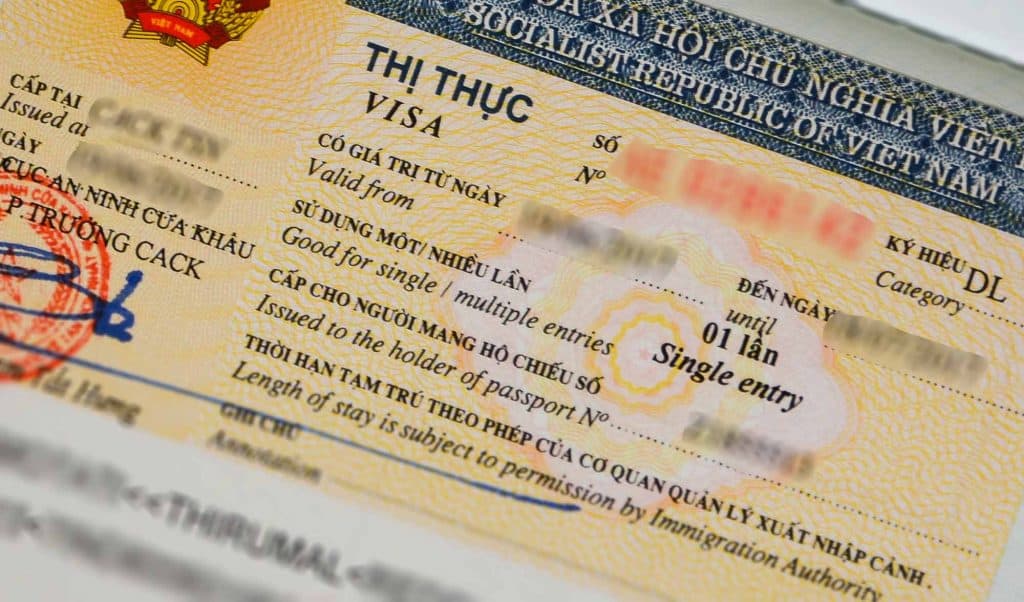
Vietnam has streamlined its visa process in recent years. As of now, Vietnam visa requirements are quite clear and easy to understand. Vietnam offers visa exemptions to quite a few nationalities. And those that require a visa can get an E-Visa or a visa from any nearest Vietnamese embassy.
Currently, there are 2 different visa options available to enter Vietnam as a tourist.
- Visa exemption: 25 countries are visa EXEMPT for stays from 14 days to 45 days
- E-Visa: All nationalities can obtain eVisa for stays up to 90 days
NOTE Vietnam 1-month or 3-month Visa on Arrival (VOA) for tourists is still suspended. It’s unclear whether Vietnam will instate its tourist VOA or instead add more countries to its E-Visa list.
Table of Contents
Vietnam visa requirements by nationality.
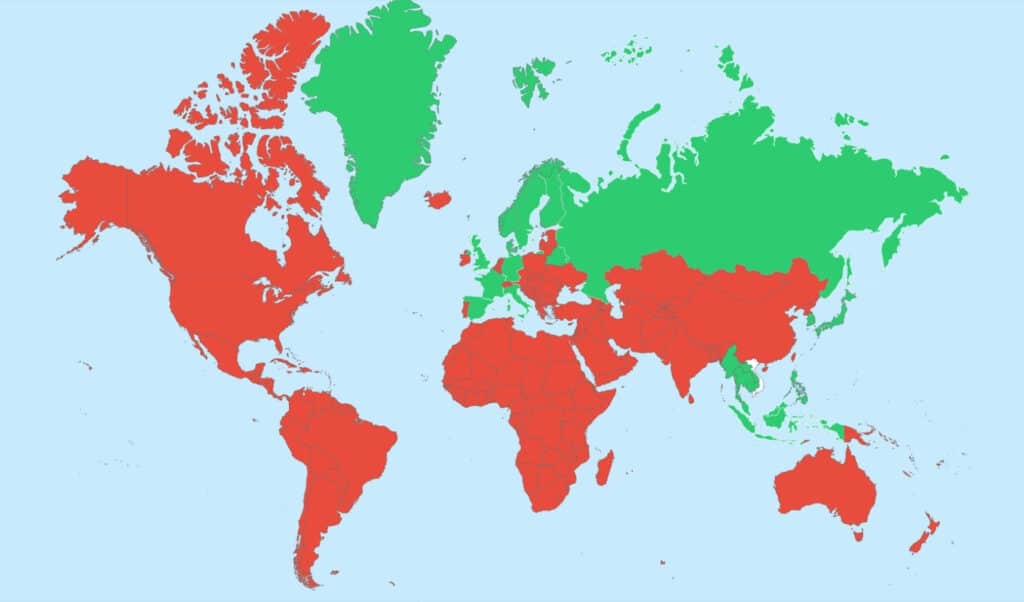
Minimum passport validity required to enter Vietnam as a tourist
Passport must be valid for at least one month beyond the visa expiration date.
VISA EXEMPT nationalities
90-day entry, 45-day entry.
- South Korea
- United Kingdom
30-day entry
21-day entry.
- Philippines
14-day entry
E-visa eligible nationalities.
- All nationalities are eligible for E-Visa
NOTE All nationalities are visa EXEMPT for visiting Phú Quốc island which is considered as a special economic zone. Must arrive and depart from the island directly and cannot transit through the mainland.
VIETNAM VISA-EXEMPTION
Nationals from 25 countries do not require any visa to enter Vietnam as a tourist. Some of these countries are from Southeast Asia and Europe.
Entry permission
Visa-exempt nationalities can stay from 14 days to 90 days in Vietnam depending on their nationality.
Documents to carry
Apart from your passport, you must also carry the below documents in print or on your smartphone.
- Proof of return or onward travel (your return or onward flight/bus/train ticket)
- Proof of accommodation (a hotel reservation for the first few days)
If you are traveling on a one-way ticket, make sure to get proof of onward ticket .
VIETNAM eVISA
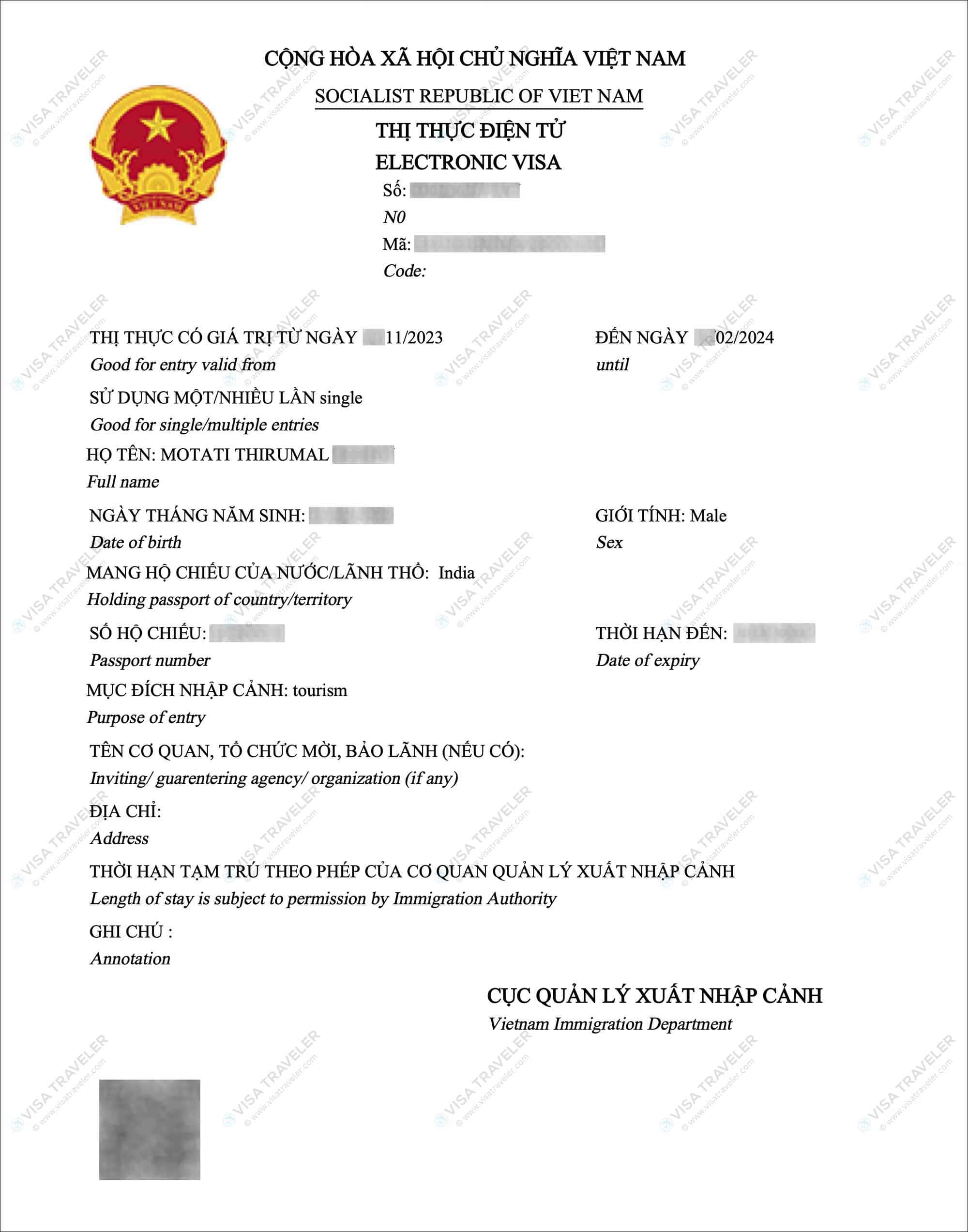
As of now, Vietnam eVisa is the only visa option available for tourists and visitors. All nationalities are eligible to apply for Vietnam eVisa.
Validity of Vietnam eVisa
The validity of Vietnam eVisa is maximum 90 days from the day of issue. You must enter and exit Vietnam within the validity of the E-Visa.
When to apply for eVisa
You can apply for your Vietnam eVisa as early as you like. The eVisa processing takes 3 working days, so you must apply at least 3 working days prior to your trip. In certain instances, it can take longer. I highly recommend applying at least two weeks prior to your trip.
How long can you stay in Vietnam on eVisa
With an E-Visa, you can stay up to 90 days or until the expiry of your eVisa, whichever is shorter. The immigration officer will write the date by which you must exit the country on the entry stamp in your passport. Usually, this exit date on your passport will match the expiration date of your eVisa.
eVisa application process
You can apply for the eVisa on the official Vietnam E-Visa Portal . You would need a scan of your passport data/ID page, a digital photo and a credit/debit card.
You can follow my step-by-step guide on applying for Vietnam eVisa . Follow along the steps outlined in the guide. It only takes 10 minutes to complete the application.
Documents required
You will need the following documents.
- Original passport
- A digital portrait photo
- A scan of your passport data/ID page
Photo requirements
The digital photograph must meet the following specifications.
- Photo must show the entire face
- Photo must be straight-looking without glasses
- Photo must be about 4 x 6 cm in dimensions
- Photo must be in JPG format only
The visa fee is $25 USD for single-entry and $50 USD for multiple-entry e-Visa. You would need a credit or debit card to pay the visa fee.
Processing time
The eVisa processing time is 3 working days, not including the day of application. If it’s taking longer than 3 working days, contact the e-Visa support.
Application tracking
You can track your application status from the Vietnam E-Visa portal application status page using your registration code, email and date of birth.
Your application can have any of the 2 statuses.
- In Processing: This status means that your application is still in process.
- Granted Visa: This status means your application is approved and ready for download
Customer service
In case of questions about your visa or visa status, you can contact the Vietnam Immigration Department at their support page, email or phone number.
WEB: E-Visa support page EMAIL: [email protected] PHONE: +84 243 825 7941
ENTRY AND EXIT PROCEDURE AT THE AIRPORT
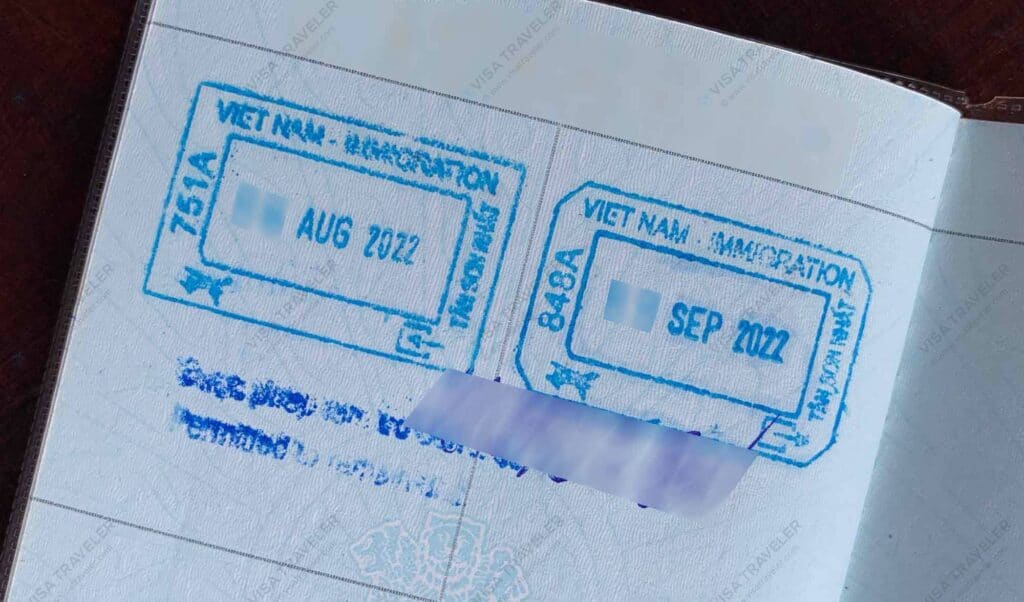
Entering Vietnam by air
After you get off your flight, walk towards immigration/passport control. If you are a visa-exempt national, present your passport and boarding pass. If you hold an eVisa, present your passport, boarding pass and a print or soft copy of your Vietnam eVisa to the immigration officer.
The immigration officer may ask a few questions such as how long you plan to stay, what you would like to do in Vietnam, etc.
The immigration office may also ask to see your return ticket. If you are flying on a one-way ticket, make sure to carry proof of an onward flight ticket to avoid any trouble at immigration.
Leaving Vietnam by air
Vietnam employs manned passport control. You will go through passport control on your exit. Present your passport and boarding pass. The immigration will not ask any questions unless you have overstayed your visa.
Vietnam has streamlined its visa process in recent years. About 25 nationalities from Southeast Asia and Europe do not require a visa to enter Vietnam. Nationals of all countries and territories are eligible to apply for eVisa.
Vietnam Visa on Arrival (VOA) is still suspended. There is no news on when VOA will be available again.
RELATED ARTICLES
- Thailand Visa for Tourists and Visitors
- Cambodia Visa for Tourists and Visitors
- Malaysia Visa for Tourists and Visitors
- Philippines Visa for Tourists and Visitors
WRITTEN BY THIRUMAL MOTATI

Thirumal Motati is an expert in tourist visa matters. He has been traveling the world on tourist visas for more than a decade. With his expertise, he has obtained several tourist visas, including the most strenuous ones such as the US, UK, Canada, and Schengen, some of which were granted multiple times. He has also set foot inside US consulates on numerous occasions. Mr. Motati has uncovered the secrets to successful visa applications. His guidance has enabled countless individuals to obtain their visas and fulfill their travel dreams. His statements have been mentioned in publications like Yahoo, BBC, The Hindu, and Travel Zoo.
PLAN YOUR TRAVEL WITH VISA TRAVELER
I highly recommend using these websites to plan your trip. I use these websites myself to apply for my visas, book my flights and hotels and purchase my travel insurance.
01. Apply for your visa
Get a verifiable flight itinerary for your visa application from DummyTicket247 . DummyTicket247 is a flight search engine to search and book flight itineraries for visas instantly. These flight itineraries are guaranteed to be valid for 2 weeks and work for all visa applications.
02. Book your fight
Find the cheapest flight tickets using Skyscanner . Skyscanner includes all budget airlines and you are guaranteed to find the cheapest flight to your destination.
03. Book your hotel
Book your hotel from Booking.com . Booking.com has pretty much every hotel, hostel and guesthouse from every destination.
04. Get your onward ticket
If traveling on a one-way ticket, use BestOnwardTicket to get proof of onward ticket for just $12, valid for 48 hours.
05. Purchase your insurance
Purchase travel medical insurance for your trip from SafetyWing . Insurance from SafetyWing covers COVID-19 and also comes with a visa letter which you can use for your visas.
Need more? Check out my travel resources page for the best websites to plan your trip.
LEGAL DISCLAIMER We are not affiliated with immigration, embassies or governments of any country. The content in this article is for educational and general informational purposes only, and shall not be understood or construed as, visa, immigration or legal advice. Your use of information provided in this article is solely at your own risk and you expressly agree not to rely upon any information contained in this article as a substitute for professional visa or immigration advice. Under no circumstance shall be held liable or responsible for any errors or omissions in this article or for any damage you may suffer in respect to any actions taken or not taken based on any or all of the information in this article. Please refer to our full disclaimer for further information.
AFFILIATE DISCLOSURE This post may contain affiliate links, which means we may receive a commission, at no extra cost to you, if you make a purchase through a link. Please refer to our full disclosure for further information.
MORE VISA GUIDES

UNITED KINGDOM

VIEW ALL VISA GUIDES
- Cookie Policy
- Copyright Notice
- Privacy Policy
- Terms of Use
- Flight Itinerary
- Hotel Reservation
- Travel Insurance
- Onward Ticket
- Testimonials
Search this site
0084 982 661 133
Viber Available
[email protected]
Send us an e-mail
- How long can I stay in Vietnam on a tourist visa?
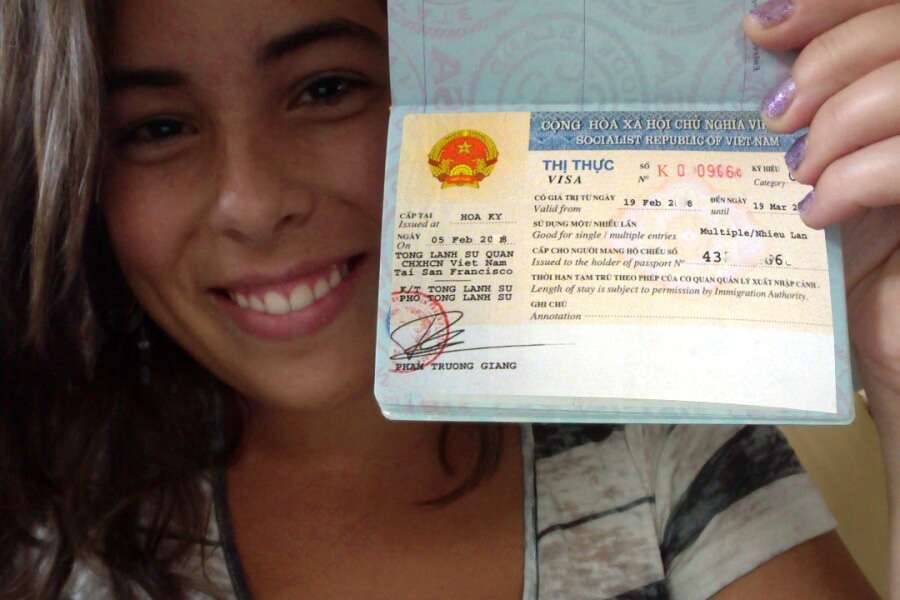
With Vietnam tourist visa (Vietnam C1 Visa), you can stay here up to 30 days (inclusive of dates of entry and exit), single entry. Of course, you can extend for 1 month visa or 3 months more if you want to stay longer. Vietnam visa extension (C1 visa extension) can be done easily when you are in Vietnam. And please note that the extension fee of Vietnam Visa is subjected to be higher than a new visa getting when you are outside the country.
Start planning your Vietnam tours today! With so much to see and do in this beautiful country, it's important to have a detailed plan in place. Our team of experts can help you create the perfect itinerary for your interests and budget.
If you do need to stay in Vietnam more than 3 months up to 1 year , you are recommended to apply for Vietnam Business Visa (B3 Vietnam Visa) in advance. You can obtain this kind of visa with Vietnam Tour or through the nearest Vietnamese Embassy in your country.
If you are planning to visit Vietnam soon, you might want to know about some new changes in the visa policy that will take effect from August 15, 2023. According to Resolution 127 of the government, Vietnam will offer electronic visas for citizens of all countries and territories who enter through any of the 42 international border gates. The electronic visas will be valid for up to 90 days and can be used for single or multiple entries. Moreover, Vietnam will extend the visa exemption period for 13 countries from 15 days to 45 days. These countries are: UK, Germany, France, Italy, Spain, Denmark, Norway, Sweden, Finland, Russia, Belarus, Japan and South Korea. These changes are expected to boost tourism and trade between Vietnam and other countries.
In order to get Vietnam Visa, applicants will be required to pay Visa service fee and Stamping fee. For those people choosing to get Vietnam Embassy Visa, both of these fees will be collected by staff working there. In this case, visa fee is not fixed because each Embassy of Vietnam requires a different fee.
The most popular type of visa for Vietnam is a tourist visa, which is normally valid for 15-90 days. You can apply for a 3-month tourist visa, but the procedure will be the same as for a 1-month visa. In other words, the validity of a Vietnamese tourist visa can range from 15 days to 3 months. If you need to stay in Vietnam for longer than 30 days, you will need to apply for a long-term visa. There are several types of long-term visas available, including business visas, student visas, and work visas. The requirements for these visas vary depending on the type of visa you are applying for. You can apply for a tourist visa at a Vietnamese embassy or consulate in your home country, or you can apply for an e-visa online. The e-visa is a convenient option, but it is only available for citizens of certain countries. To apply for a tourist visa, you will need to provide the following documents: A passport that is valid for at least six months A completed visa application form A recent passport-sized photo A visa fee If you are applying for a long-term visa, you will need to provide additional documents, such as a letter of invitation from a Vietnamese sponsor, a proof of financial support, and a medical certificate. The processing time for a tourist visa varies, but it is typically 3-5 working days. The processing time for a long-term visa can be longer, up to 15 working days.
About visa on arrival, to get this visa issued, each subtype of fee is required to pay for two separate steps. In more details, visa service fee is charged to process preapproved visa letter and stamping fee is paid to grant an official visa stamped onto passenger’s passport. Unlike embassy visa, the cost of Vietnam visa online is quoted clearly for each visa type at Vietnam visa fee page.
In order to request visa, foreign travelers can visit Vietnam Embassy and apply in person or apply online for visa upon arrival, or e-visa. Among these ways, getting Vietnam visa upon arrival and obtaining an e-visa are more recommended than the other option because of their simplicity of procedure.
If you need further information and support in Vietnam Visa , please contact us via email: This email address is being protected from spambots. You need JavaScript enabled to view it. or leave a message on our Live Chat System.
Frequently Asked Questions
Can i get a 3 month tourist visa for vietnam.
- A passport that is valid for at least six months
- A completed visa application form
- A recent passport-sized photo
How long can a US citizen stay in Vietnam?
Americans can stay in Vietnam for a maximum of 30 days in total with a single entry eVisa and then have to leave or do an extension in the country. Tourist visas are typically issued for a one-time entry that is 1 to 3 months, whereas, for multiple entries, work or business visas may be issued for up to one year. Even the U.S passport holders are granted 1 year multiple entry tourist visa, the maximum duration for each visit is 90 days. It means that you can’t stay in Vietnam for more than 3 months at a time, and have to leave the country and return for another 3 months of stay.
Can US citizens get visa on arrival in Vietnam?
US citizens can get a visa on arrival in Vietnam if they apply online and receive an approval letter before their trip. This option is convenient, simple, low cost and timesaving. US citizens need a visa to visit Vietnam for both tourism and business purposes. Their passport must be valid for six months after their Vietnam arrival date.
How long does it take to get a Vietnam eVisa?
Vietnam eVisa usually takes 3 to 7 business days to process under normal circumstances. However, during public holidays, processing times may be longer due to an increase in the volume of applications received. You can apply for an eVisa online and receive an approval letter before your trip. The eVisa is valid for 30 days and single entry only. The eVisa fee is 25 USD for card payments. You can check your eVisa status and download your eVisa result by using your registration code, email and date of birth.
- How long does it take to get a visa to visit Vietnam?
- Halong Bay Tours - How to plan your trip?
- What to Do in Vietnam: A Guide for Travelers
- Vietnam Tourist Season: When to Go and What to Expect
- Travel to Vietnam from Portugal
- Things to do in Hue
- Vietnam Vacations from Spain
- Vietnam Tour Packages from Finland
- Do Spanish citizens need a visa to Vietnam?
- Things to do in Nha Trang
Questions & Answers
Ask a question.
We answer all questions, however, some questions we will answer privately via email so they will not appear on this website.
Name (required)
E-mail (required, but will not display)
Notify me of follow-up questions or answers
Request A Free Quote
Vietnam travel guides.
- Vietnam Attractions
- Destinations
- Nightlife in Vietnam
- Festivals & Cuisine
- Travel News
- Why Vietnam
For Travellers
- Top 10 Vietnam attractions by Trip Advisor
Things to Know
- Best Places to Visit in Vietnam in 2024
- 20 Best Beaches in Vietnam
- How to Recognize Vietnamese Currency?
- Vietnam Tours from USA - All you need to know
- 10 reasons why Vietnam is a great destination for your vacation
Latest News
- Vietnam's Thriving Tourism Industry
- THE 38 BEST Things to Do in Vietnam
- Vietnam Holiday from South Africa
- Hanoi Attractions During Coronavirus Pandemic
Travel Guides
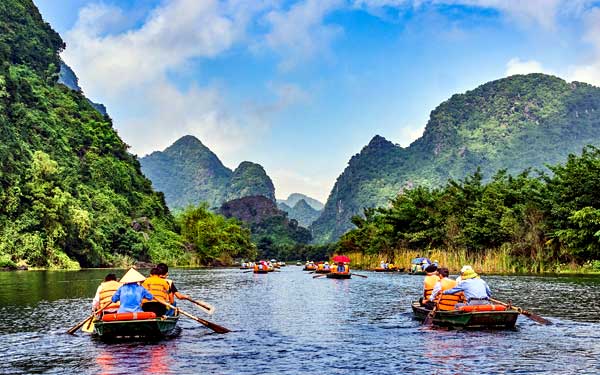
- Testimonials
- Travel Tips
- Privacy Policy
- Term & Conditions
Vietnam Solved

Tourist Visa In Vietnam: A Simple Guide
Planning a jaunt to the land of ascending dragons and wondering about the visa dance?
You’re in the right place!
This guide will demystify the nitty-gritty of securing a tourist visa to Vietnam, ensuring you can focus on the fun stuff—like which breathtaking locale to visit first!
Let’s dive in!
Visa Fees For A Tourist Visa

The visa fees can vary depending on several factors, including your nationality, the type of visa you are applying for, the duration of your stay, and the application method. The general visa fees are:
Types Of Visa
- A single entry visa costs 606,000 VND .
- A multiple-entry visa costs 1,210,000 VND .
Similar Posts

Social Security Number In Vietnam: Explained
Navigating the bureaucratic labyrinth to obtain a Social Security number in Vietnam can be as perplexing as a Vietnamese street market. But fear not! You’re about to embark on a guided tour that deciphers the complexities for you, all served with a side of wit. Let’s dive in! What Is The Equivalent To Social Security…

Temporary Residence Permits In Vietnam
Embarking on a journey to Vietnam, whether for work, adventure, or love, often comes with a swirl of excitement and a dash of bureaucracy. Looking to reside in Vietnam? Worry Not! We’ve got you covered! Navigating the labyrinth of legal requirements can be as challenging as learning to cross the bustling streets of Hanoi. This…

Dual Citizenship In Vietnam: Complete Guide
Ever dreamt of savoring a Banh Mi in Ho Chi Minh City while still feeling the patriotic pull of your homeland? Well, dual citizenship in Vietnam might just be your golden ticket. Dive into this guide to find out how you can live the expat dream with one foot in Vietnam and the other back…

Vietnam Citizenship: All You Need To Know
So you’ve fallen in love with Vietnam, and now you’re thinking of making it official citizenship style. While the journey from bánh mì enthusiast to bona fide citizen is not without its hurdles. This guide will serve as your friendly GPS through Vietnam’s complex citizenship landscape. Buckle up! Let’s dive in! What Does It Mean…

Spouse Visa In Vietnam: All You Need To Know
Navigating the labyrinth of paperwork for visas can feel like deciphering an ancient code. And if it’s for a spouse visa in Vietnam? Well, let’s just say it’s like playing charades with a mime. But fret not! We’ve demystified the process for you. Let’s dive in! What Is A 5 Year Visa Exemption? This is…
Leave a Reply Cancel reply
Your email address will not be published. Required fields are marked *
Save my name, email, and website in this browser for the next time I comment.
You are using an outdated browser. Please upgrade your browser to improve your experience.
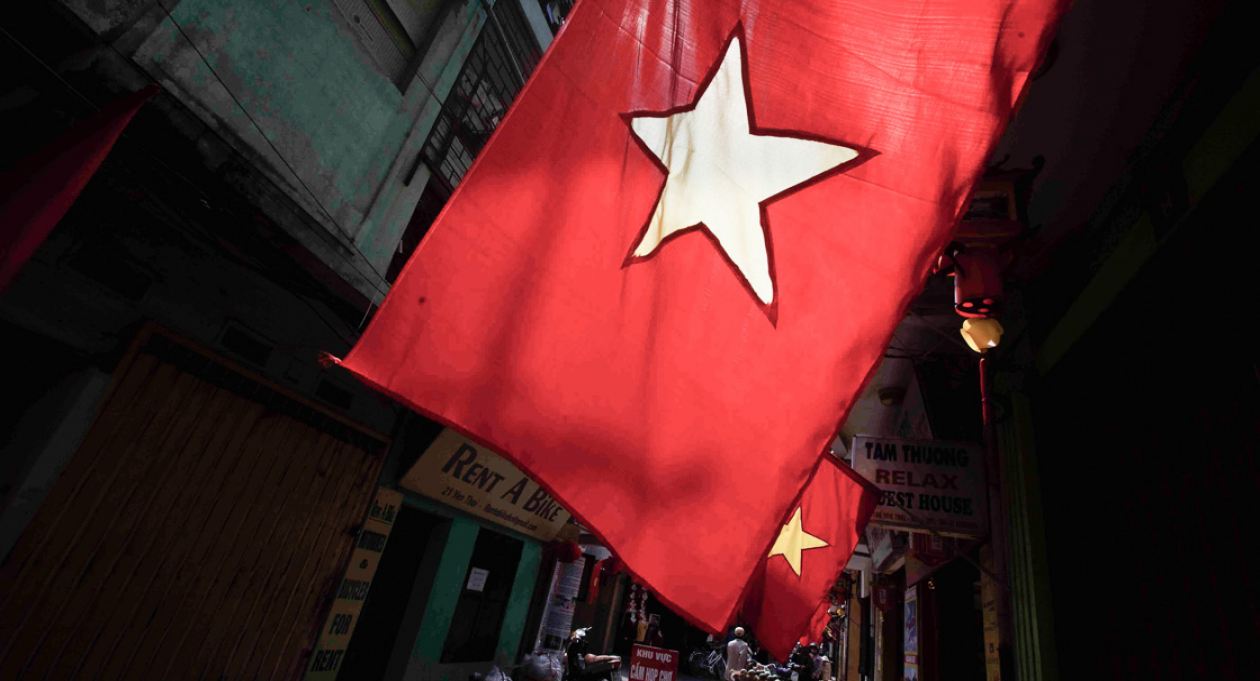
An official guide to e-Visas for Vietnam
From 15th august 2023, citizens of all countries and territories around the world can apply for electronic visas (e-visas) entering vietnam and enjoy the 90-day e-visa duration, valid for multiple entry..
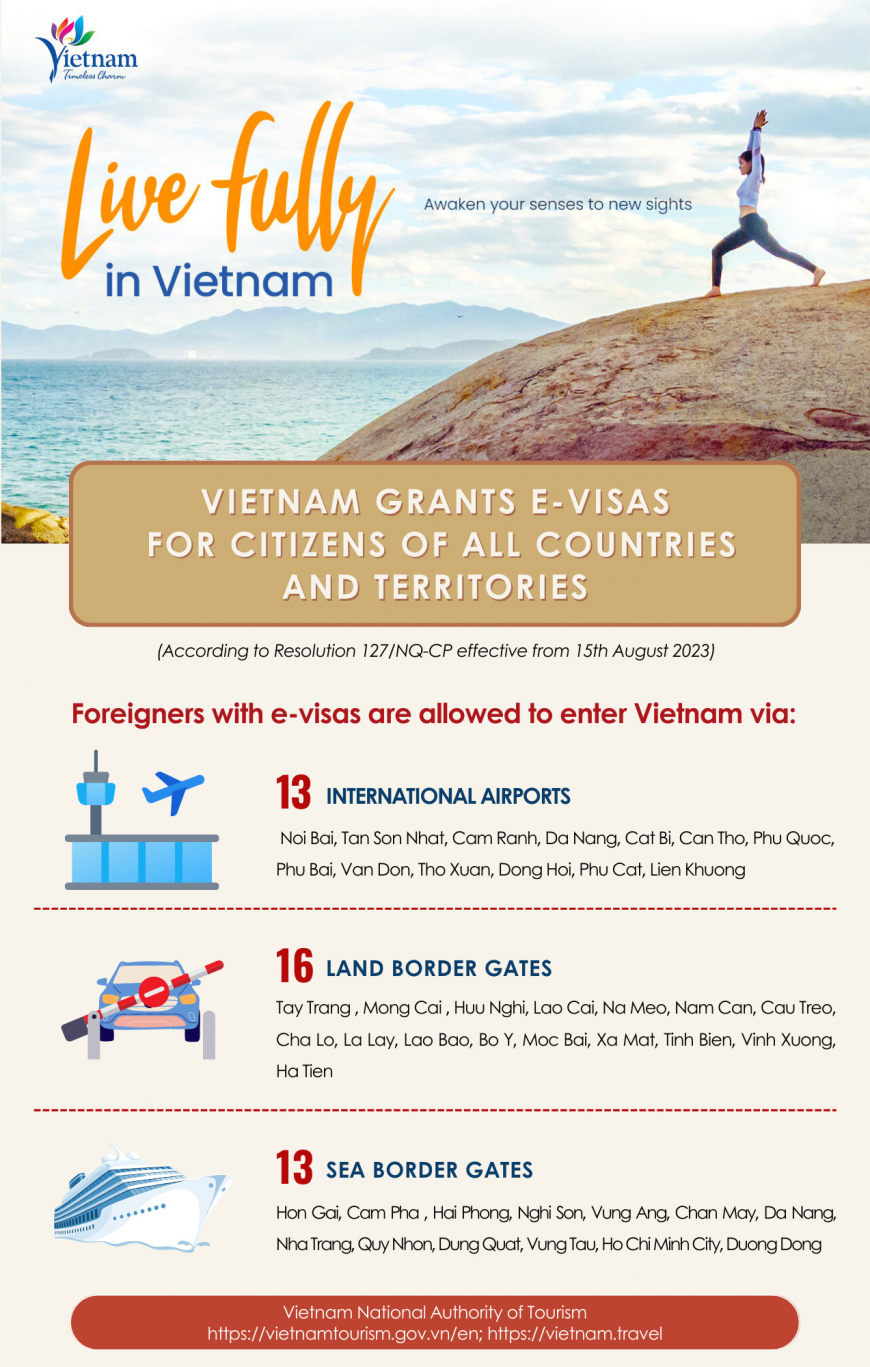
Foreigners with e-visas are allowed to enter Vietnam via:
13 international airports: Noi Bai (Ha Noi), Tan Son Nhat (Ho Chi Minh City), Cam Ranh (Khanh Hoa), Da Nang, Cat Bi (Hai Phong), Can Tho, Phu Quoc (Kien Giang), Phu Bai (Thua Thien Hue), Van Don (Quang Ninh), Tho Xuan (Thanh Hoa), Dong Hoi (Quang Binh), Phu Cat (Binh Dinh), Lien Khuong (Lam Dong).
16 land border gates: Tay Trang (Dien Bien), Mong Cai (Quang Ninh), Huu Nghi (Lang Son), Lao Cai, Na Meo (Thanh Hoa), Nam Can (Nghe An), Cau Treo (Ha Tinh), Cha Lo (Quang Binh), La Lay and Lao Bao (Quang Tri), Bo Y (Kon Tum), Moc Bai and Xa Mat (Tay Ninh), Tinh Bien and Vinh Xuong (An Giang), Ha Tien (Kien Giang).
13 sea border gates: Hon Gai and Cam Pha (Quang Ninh), Hai Phong, Nghi Son (Thanh Hoa), Vung Ang (Ha Tinh), Chan May (Thua Thien Hue), Da Nang, Nha Trang (Khanh Hoa), Quy Nhon (Binh Dinh), Dung Quat (Quang Ngai), Vung Tau (Ba Ria - Vung Tau), Ho Chi Minh City, Duong Dong (Kien Giang).
What is Vietnam’s e-visa?
Vietnam's e-visa is one of several visa types offered by the Vietnam Immigration Department to foreigners entering the country. The e-visa is valid for 90 days, and multiple entry. As of 15th August 2023, Vietnam's e-visa is available to all countries/territories around the world.
Travellers can apply directly for e-visas at Vietnam e-Visa Official Website
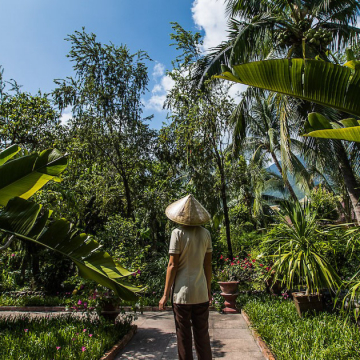
- You are here:
- Things to do
- An official guide to e-Visas in Vietnam
Create an account
Already have an account? Click here to sign in
By clicking submit, you agree to our Privacy Policy and Terms of Use
Sign in with your social accounts
Sign in with your email
Forgot password? Click here to get it back
Don't have an account? Sign up here
Forgot Password
The entered email has subscribed for Vietnam Tourism monthly newsletter

Embassy of the
Socialist republic of vietnam, in the united states of america.
- Ambassador Pham Quang Vinh (2014 - 2018)
- Ambassador Nguyen Quoc Cuong (2011-2014)
- Ambassador Le Cong Phung (2008 - 2011)
- Ambassador Nguyen Tam Chien (2001 - 2007)
- Ambassador Le Van Bang (1995 - 2001)
- Offices/Sections
- Foreign Policy
- Viet Nam's visa procedures
- Visa Exemption
- PASSPORT ISSUANCE, RENEWAL, OR ANNOTATION
- Legalization of documents for marriage
- power of attorney
- Birth registration
- Certificate of Vietnamese origin
- Citizen registration
- Renouncement of Vietnamese citizenship
- Legalization
- permit to transport remains and dead bodies to Vietnam
- Instructions For Registration to Retain Vietnamese Citizenship
- Embassy Activities
- Joint Statements
Search form
Fri, 03 May 2024 13:46:24 -0400
You are here
I. to apply for a visa to come to vietnam, you have the following options:.
For you best convenience in applying tourist visa to Viet Nam, you can leave the required information on our visa application assistant portal: https://vnmvisa-assistant.web.app
1. APPLY AT THE EMBASSY (STANDARD VISA)
a) Apply in-person at the Embassy ;
b) Apply by mail to the Embassy .
Address and contacts: see Part IV below
2. APPLY THROUGH THE IMMIGRATION DEPARTMENT (EVISA)
Access the link administered by the Immigration Department, Ministry of Public Security of Viet Nam (evisa.xuatnhapcanh.gov.vn)
Note: If have any difficulties or problems occur while applying for the e-visa, please contact the Immigration Department, Ministry of Public Security via email: [email protected] or hotline: +84.24.382.640.26
II. Processing time (at the Embassy of Viet Nam)
1. If applicant hasn't had the letter of approval: Five (05) working days after submission of complete application with all required documentation and fee
* Expedited service: 1 (one) to 4 (four) working days upon your request (to be issued at the Embassy). In case applying by mail, kindly attach an Expedited service or URGENT note/label on your envelope or in your application package.
2. If applicant already had the letter of approval: Three (03) business days after submission of complete application with all required documentation and fee.
* Expedited service: 24-hour processing time (additional fee is required). Kindly attach an Expedited service or URGENT note/label on your envelope or in your application package.
*Note: You can request your hosting/ inviting organization or individual to carry out the procedures to request the competent authority of Vietnam to grant the approval
III. Other important notices
* Make sure you check all personal information printed on your visa. In case you find any inaccuracy, please contact the Embassy immediately for correction.
* Visa’s length and number of entries: your visa can be issued with the length and the number of entries not exceeding that indicated in the visa approval by the competent authority of Vietnam. US citizens can be granted multiple visas with the length up to 01 year.
* Duration of stay: the length of your visa validity is indicated on the visa. You can only enter Viet Nam from the date of entry printed on the visa and must leave by the end of the expiration date.
* The Embassy reserves the right to request further information and documentation from applicants and reject any visa application without explanation
IV. For more information (only for visa applicant at the Embassy) , please contact the Consular Division of the Embassy:
* Business hours: 9:00 A.M – 12:00 P.M and 02:00 P.M – 04:30 P.M from Monday through Friday, except on Viet Nam and United States holidays .
- Address: 1233 20th Street NW, Suite 400, Washington D.C., 20036.
- Telephone: (202) 999 6589 (text message/call); (202) 716 8666 (text message/call); (202) 999 6938 (text message/call).
- Fax: 202-861-0917; Email: [email protected]

- The Embassy
- Consular Services
- Vietnam - US Relations
Add: 1233 20th St NW, Ste 400, Washington, DC 20036
Tel: 202-861-0737
Consular emergency: 202-716-8666
For visa inquiries only: 202-999-6589
Fax: 202-861-0917
[email protected] (consular affairs)
[email protected] (general information)
Hours of Operation (EST)
Embassy: Mon - Fri, 10:00 am to 12:00 pm & 2:00 pm to 5:00 pm
Consulate: Mon - Fri, 09:00 am to 12:00 pm & 2:00 pm to 4:30 pm
Featured Links
Do I need a visa to go to Vietnam?

Aug 10, 2023 • 6 min read

Here's what you need to know about visa requirements for Vietnam © Matthew Micah Wright / Getty Images
Whether you’re planning to bask on the beaches, scramble through the jungles, time-travel in historic townships or set up as a digital nomad in hip Hanoi, the chances are you’ll need a visa to visit Vietnam , except for short visits of less than 15 days.
But there’s good news – while there’s red tape to wriggle through, many nationalities can apply for an E-Visa online, saving time and money.
Vietnam imposed tight COVID restrictions at the height of the pandemic, but these days, you can visit without a Covid test or proof of vaccination. Getting hold of a visa has also become easier, with a dedicated government portal for E-Visa applications. Here’s what you need to know about the entry requirements for Vietnam.
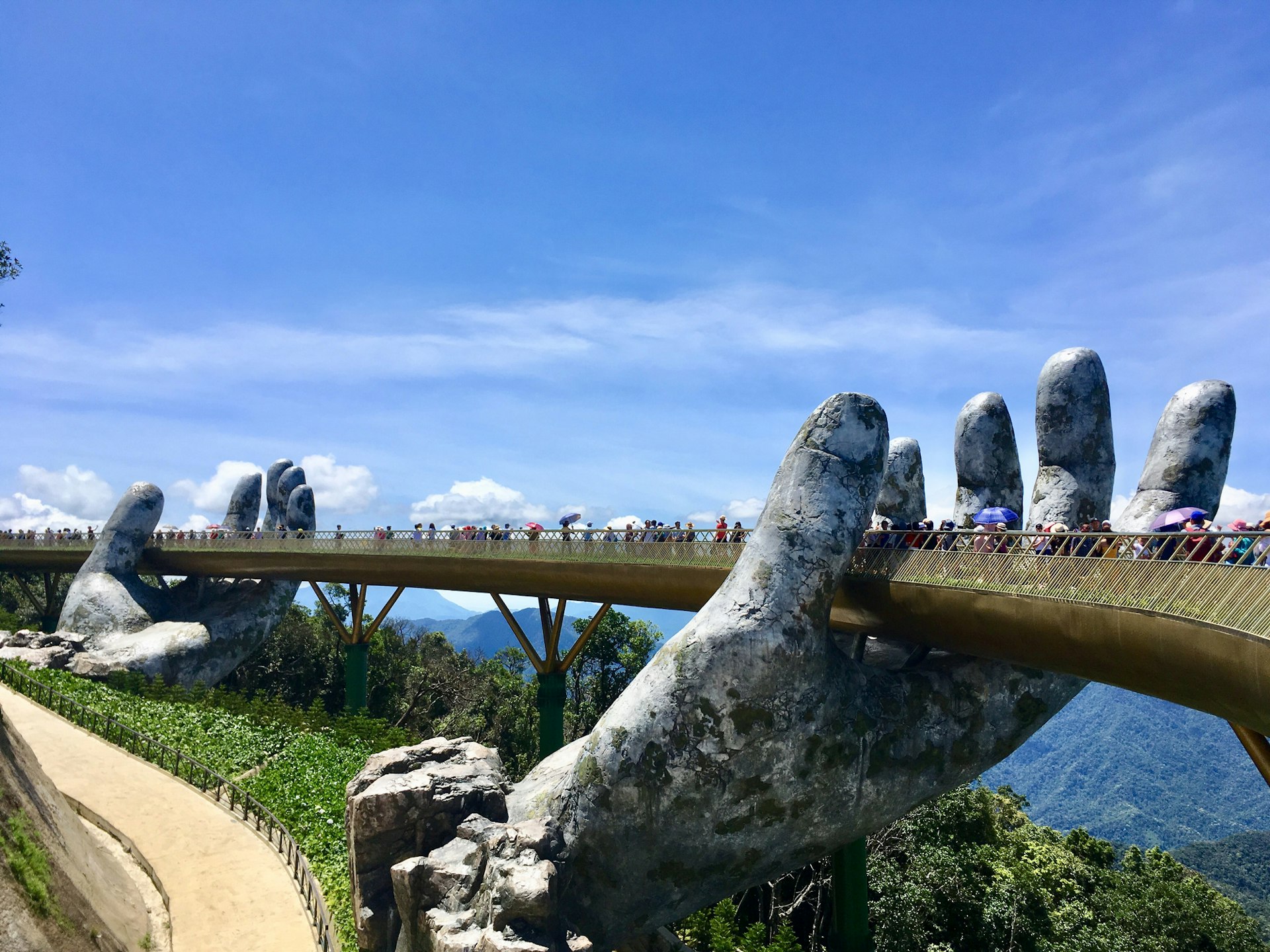
Who needs a visa to visit Vietnam?
Whether or not you need a visa to visit Vietnam will depend on where you live and how long you’re planning to stay. Citizens of neighboring nations in Southeast Asia, including Cambodia, Thailand, Malaysia, Singapore, Indonesia, and Laos, can visit for 30 days without a visa. Citizens of the Philippines can stay for 21 days visa-free, citizens of South Korea and Japan can stay without a visa for 15 days and citizens of Brunei and Myanmar can stay visa-free for 14 days.
How about travelers from Europe?
There’s good news for European travelers – citizens of Sweden, Norway, Denmark, and Finland can travel visa-free for 15 days, reflecting the fact that these countries were among the first foreign powers to recognize the Socialist Republic of Vietnam. British, German, French, Spanish and Russian citizens can also visit without a visa for 15 days.
What about everyone else?
Travelers from the rest of Europe and the rest of the world will need a visa to visit Vietnam, as will travelers from visa-exempt countries visiting for more than the approved number of days, and visitors coming for business or other non-tourism purposes.
How do I get a visa?
There are three ways to get hold of a visa. You can apply the old-fashioned way via the Vietnamese embassy or consulate in your home country (either in person or by post); you can apply for a Visa on Arrival via a Vietnamese visa agency; or you can apply for an E-Visa online before you travel.

How long are Vietnam visas valid?
Standard tourist visas are valid for 30 or 90 days. You can apply for either a single entry or multiple entries, and visas can be extended within Vietnam for an additional fee. For visas for business trips, contact your local Vietnamese embassy or consulate – there’s a list of overseas missions on the website of the Ministry for Foreign Affairs . Digital nomads generally travel on tourist visas.
What are the special visa rules for Phu Quoc Island?
Travelers visiting Phu Quoc – Vietnam’s best-loved tropical island – can stay for up to 30 days visa-free. This applies even if you don’t come from a visa-exempt country, but you must enter Phu Quoc by air. On arrival, you can apply for a visa allowing entry to the rest of Vietnam or stays of more than 30 days.
How do I apply for an E-Visa?
The government’s slightly confusing E-Visa portal is the place to apply for an electronic visa. These visas are valid for 30 days and allow a single entry. You can enter via any approved air, land, or sea border but the port of entry must be listed on your application. The process takes three working days, and the scheme is open to citizens of 80 countries, including most nations in Europe, the US, Canada, Australia, and New Zealand.
You’ll need to provide a high-resolution digital passport photo and a scan of your passport ID pages when you apply. Be sure to note down the registration number for your application – you’ll need this to access the downloadable PDF file containing your visa (print and carry two copies with you when you travel).
How do I apply for a Visa on Arrival?
If you fly into Vietnam and land at Tan Son Nhat International Airport in Ho Chi Minh City , Noi Bai International Airport in Hanoi , or Da Nang International Airport in Da Nang , you can apply for a Visa on Arrival via an online visa agency such as Vietnam Visa Center or Vietnam Visa , but this is a more expensive option.
In fact, this is a two-part process. As well as paying a fee for the online application, you’ll need to pay a second fee on arrival in Vietnam for the visa to be physically added to your passport. The online application takes two working days to process, but you can also pay extra for an expedited one-day or four-hour service.

How much does a Vietnam visa cost?
Visa prices vary depending on where you obtain your visa – travelers who apply online pay different fees to people applying in person or by post at embassies and consulates. For a standard 30-day E-Visa, the fee is US$25. Contact your local embassy or consulate for fees for in-person or postal applications.
To get a Visa on Arrival, you must first pay a fee to a visa agency for a "visa pre-approval letter". For a single-entry visa, this costs around US$17 for 30 days and US$25 for 90 days. For a multiple-entry visa, the fee is around US$20 for 30 days and US$65 for 90 days.
You’ll need to pay a second fee, known as a "Stamping Fee", when you reach Vietnam, using foreign currency. This costs US$25 for a single-entry visa and US$50 for a multiple-entry visa. Different fees apply for visitors from most of Africa and the Middle East and some countries in Asia.
Applying for a visa – the practicalities
Whether you apply online or in person at your local embassy or consulate, your passport should be valid for at least six months after your proposed date of exit from Vietnam. You can enter on or after the date of entry you declare on the application form, but you must still exit by the expiry date printed on your visa.
If you apply in person or by post, you’ll also need to provide some passport photos with your application form. If you apply online, you’ll need high quality digital passport photos; for a Visa on Arrival, bring two 4cm by 6cm photos to hand over when you pay the stamping fee.
Can I extend my visa in Vietnam?
It isn’t too tricky to extend a tourist visa while in Vietnam, but you’ll need to enlist the help of a local visa agency. The procedure can take up to a week and you must apply before your original visa expires. It may be possible to get an extension of 15, 30 or 60 days, depending on the visa you currently hold.
Fees vary from agency to agency and depend on the duration of the extension. In practice, extensions are easiest to arrange in Ho Chi Minh City, Hanoi, Danang and Hue . Note that additional fees apply if you apply to extend your visa in a different location to the city where you first arrived in Vietnam.
This article was first published Mar 25, 2021 and updated Aug 10, 2023.
Explore related stories
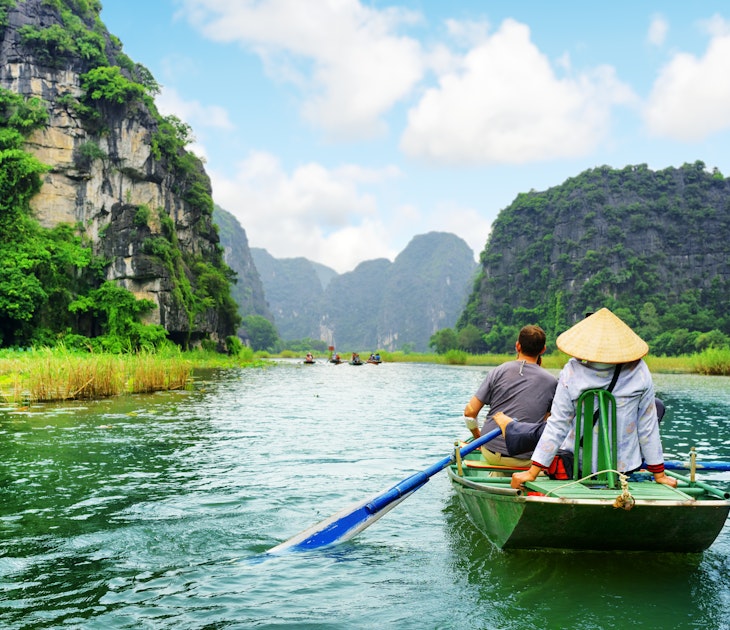
Mar 14, 2024 • 10 min read
Whether it's bus, train, private car, motorcycle, bike, plane or boat, you can plan your trip around Vietnam with this guide to getting around.

Feb 24, 2024 • 8 min read

Feb 22, 2024 • 5 min read

Feb 19, 2024 • 7 min read

Feb 3, 2024 • 7 min read

Jan 29, 2024 • 11 min read

Jan 17, 2024 • 8 min read

Jan 2, 2024 • 11 min read
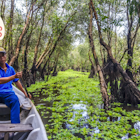
Nov 17, 2023 • 5 min read
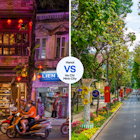
Nov 16, 2023 • 7 min read
- Privacy Policy
- Terms and Conditions
- Payment Guidelines
Have a Question?
How to get a visa for vietnam: frequently asked questions.
Travellers often have many questions regarding their upcoming trips. Where will you stay? What are your plans upon arrival? People who are traveling outside of their home countries may also ask, “What about a visa?”
Visas are often a necessary part of travelling internationally. The necessary steps to obtain a visa vary from country to country and depend on the traveller’s passport country. In the post below, we answer frequently asked questions regarding getting a visa to enter Vietnam. With the right guidance and planning, travellers can navigate the Vietnam visa process with ease.

1. What is a visa on arrival?
A visa on arrival (VOA) is a legal document approved by the Vietnam Department of Immigration. Some of the benefits of a VOA include:
- Legitimacy : The Vietnam Department of Immigration is the authority that grants and approves each VOA.
- Convenience : VOAs involve an easy online application and do not require you to send in your passport or passport photos before you travel. Also, VOA applications typically do not face delays.
- Cost-effectiveness : VOAs are often the lowest cost method for obtaining a Vietnam visa. This benefit is particularly important for budget travellers who wish to travel inexpensively.
- Speed : A traveller can complete a visa on arrival application within two working days. Often, if there is an emergency, the Department of Immigration may be able to grant a Vietnam visa within two to three hours. If you need an emergency visa on arrival, reach out to our team directly to discuss your emergency visa needs.
2. Are visas on arrival legitimate?
Yes, visas on arrival are legitimate. A Vietnam visa on arrival is a legitimate way to receive a visa to visit Vietnam, and in fact, visas on arrival are one of the most common ways that travellers to Vietnam source their visas. In addition to the legitimacy of VOAs, many people consider visas on arrival to be the most convenient, fastest, and affordable ways to obtain a Vietnam visa. In many cases, travellers can get entry visas as low as US $17 per visa, depending on a traveller’s length of stay and desired number of entries. The Vietnam Department of Immigration grants all types of visas on arrival. Travellers can then pick up their approved visas on arrival after landing at one of Vietnam’s international airports.
3.What is the visa approval letter?
The Vietnam Department of Immigration grants visa approval letters, which allow travellers to enter and exit Vietnam for a given period of time. With a visa approval letter, travellers can pick up your visa on arrival at one of the several international airports in Vietnam. These international airports include:
- Ho Chi Minh City
At the airport, the entry authority will verify the details of the visa approval letter based on your passport and travel documents. As long as you have entered the correct information on your visa application, you should have no problems gaining entry into Vietnam with your visa approval letter. Once the immigration officer reviews your documents, the officer will stamp your Vietnam visa in your passport.
4.How long does it take to get the visa approval letter?
The Vietnam Department of Immigration processes visa approval letters and emails them to travellers typically within two business days of the traveller’s application. Processing days do not include Saturday, Sunday, and major national and international holidays. In some cases, travellers may be able to receive an expedited visa approval letter for an extra service fee. How much is a Vietnam visa on arrival with expedited processing? Expedited visa on arrival processing options include:
- Processing within four to eight hours for an additional $20 per applicant.
- Processing within one business day for an additional $10 per applicant.
- Urgent processing on national or international holidays. For urgent processing, please call us or contact us via email for details and assistance
Please take note that the above urgent processing times do not apply between 12:00 PM Friday and 9:00 AM Monday, local time in Vietnam. Please consider the time difference between Vietnam and your application location. However, note that visa desks at Vietnam’s international airports are open 24/7. As long as you have your visa approval letter, you will still be able to get your Vietnam visa on a weekend arrival.
5. How do I receive my visa approval letter?
Receiving your visa approval letter is easy and convenient. We send travellers a scanned file of their visa approval letters via email. So, please be sure to provide us with your correct email address. You will need the latest version of Adobe Acrobat Reader in order to open the file. Travellers will then need to print their visa approval letters and present their printed copies upon arriving into Vietnam.
6. Are there any exceptions for entry into Vietnam with a visa on arrival?
A visa on arrival is only valid for people who will arrive in Vietnam at one of Vietnam’s international airports. Travelers entering Vietnam by land or sea must visit a Vietnam Embassy to get their visa stamp. Vietnam immigration officials will accept visa approval letters at the following international airports in Vietnam:
- Noi Bai International Airport (Hanoi)
- Tan Son Nhat International Airport (Ho Chi Minh City)
- Danang Airport (Da Nang)
- Cam Ranh Airport (Nha Trang)
There is a 15-day free visa exemption for some passport holders. The Vietnam Department of Immigraition offers this exemption to passport holders from the United Kingdom, France, Spain, Italy, and Germany. Travelers from those countries can travel to Vietnam without a visa for 15 days. Passport holders from Japan, South Korea, Philippines, and Chile can also enjoy visa exempt stay. The visa-exempt stay duration for travellers from those countries is between 14 to 90 days. Travellers who wish to obtain long-term Vietnam visas will need to apply for a visa on arrival or a visa from their country’s Vietnam embassy.
7. Do you require a scan of my passport?
We do not require passport scans for online visa applications. However, it is often a good idea for travellers to carry a copy of their passports with them during their travels. If travellers lose their passports, a passport copy may come in handy.
8. Do I need to provide a photo for my Vietnam visa? If so, what size photo do I need?
Yes, travellers need to provide photos for their visas on arrival. Travellers must bring at least two standard passport photos. The required photo size is 4cm x 6cm. Please note that if you do not have time to prepare these photos before your departure, you can have the photo vendors take your picture at the airport in Vietnam for about US $2 per photo. Of course, travellers will also need to provide photo ID upon arrival to Vietnam.
9. What if my passport has expired?
To apply for a visa to visit Vietnam, your passport must be valid for at least six months following your intended date of arrival. Therefore, if your passport is about to expire, please renew it before applying for a visa to Vietnam in order to avoid unwanted issues at the airport.
10. Do I need to provide the exact date of my arrival on my visa application? What if I am unsure when I will arrive?
Travellers do need to provide a date of arrival. The arrival date you provide should be the earliest you plan to arrive. If your plans change and you arrive after the arrival date you provided, that is fine. However, you can not arrive before the listed arrival date. Also, the departure date you provide on your application is the last day that you can stay in Vietnam. If you wish to extend your stay, you must apply for a visa extension. For example, if you apply for a one-month visa and submit your arrival date as January 1 st , 2021, your visa approval letter will be valid from January 1 st to February 1 st , 2021. You can enter the country at any time during January, but you must leave on or before February 1 st .
11. What is the stamping fee?
The visa stamping fee is the fee that travellers need to pay at a Vietnam airport to get the official Vietnam visa stamped in their passports. The stamping fee is $25 USD for a single-entry visa between one to three months, and the stamping fee is $50 USD for a multiple-entry visa between one to three months. Note that travellers must pay the stamping fee in cash using either Vietnam dong or U.S. dollars. The immigration officials at the airport do not accept credit cards, and it may be difficult to find an ATM.
12. Can I travel without a visa approval letter and still get a visa when I arrive in Vietnam?
No, you cannot. In order to board the plane, you must show your visa approval letter to the airline representatives. We strongly recommend that you apply for your Vietnam visa before you leave for Vietnam in order to avoid a delay at the airport or a need to change your flight.
13. What if I change my flight and arrive at another airport in Vietnam?
A Vietnam visa on arrival works at any of Vietnam’s four international airports, including:
- Tan Son Nhat (Ho Chi Minh City)
If you change your flight to any of the above airports, you should not expect any problems obtaining your visa. However, note that your date of entry in Vietnam needs to be after the arrival date and before the departure date that you listed on your visa on arrival application form.
We want the process of obtaining your Vietnam visa to go smoothly. For additional assistance, please contact our team at Vietnam Visa. You can reach us by email at [email protected] , or you can call us on our hotline at (+84) 832-320-320.
Update April 12, 2024
Information for u.s. citizens in the middle east.
- Travel Advisories |
- Contact Us |
- MyTravelGov |
Find U.S. Embassies & Consulates
Travel.state.gov, congressional liaison, special issuance agency, u.s. passports, international travel, intercountry adoption, international parental child abduction, records and authentications, popular links, travel advisories, mytravelgov, stay connected, legal resources, legal information, info for u.s. law enforcement, replace or certify documents.
Before You Go
Learn About Your Destination
While Abroad
Emergencies
Share this page:
Travel Advisory July 24, 2023
Vietnam - level 1: exercise normal precautions.
Reissued with obsolete COVID-19 page links removed. Exercise normal precautions in Vietnam.
Read the country information page for additional information on travel to Vietnam.
If you decide to travel to Vietnam:
- Enroll in the Smart Traveler Enrollment Program (STEP) to receive Alerts and make it easier to locate you in an emergency.
- Follow the Department of State on Facebook and Twitter .
- Review the Country Security Report for Vietnam.
- Visit the CDC page for the latest Travel Health Information related to your travel.
- Prepare a contingency plan for emergency situations. Review the Traveler’s Checklist .
Embassy Messages
View Alerts and Messages Archive
Quick Facts
Must have six months’ validity remaining.
One visa page required for entry stamp.
Not required.
None. However, Vietnamese Dong in excess of VND 15,000,000 or foreign currency in excess of 5,000 U.S. dollars or equivalent must be declared.
Embassies and Consulates
U.S. Embassy Hanoi - Consular Annex 170 Ngoc Khanh Ba Dinh District Hanoi, Vietnam Telephone: From outside Vietnam: +84-24-3850-5000 From the U.S.: 011-84-24-3850-5000 From landline within Hanoi: 3850-5000 From mobile or landline within Vietnam: 024-3850-5000
Emergency: From outside Vietnam: +84-24-3850-5000 or +84-24-3850-5105 From the U.S.: 011-84-24-3850-5000 From landline within Hanoi: 3850-5000 or 3850-5105 From mobile or landline within Vietnam: 024-3850-5000 or 024-3850-5105 Fax: (+84-24) 3850-5010 Email: [email protected] Facebook
U.S. Consulate General Ho Chi Minh City 4 Le Duan, District 1 Ho Chi Minh City, Vietnam Telephone: From outside Vietnam: +84-28-3520-4200 From the U.S.: 011-84-28-3520-4200 From landline within Ho Chi Minh City: 3520-4200 From mobile or landline within Vietnam: 028-3520-4200
Emergency: From outside Vietnam: +84-28-3520-4200 From the U.S.: 011-84-28-3520-4200 From landline within Ho Chi Minh City: 3520-4200 From mobile or landline within Vietnam: 028-3520-4200 Fax: (+84-8) 3520-4244 Email: Contact Us Here
EMERGENCY TELEPHONE NUMBERS WITHIN VIETNAM
Police: 113 Fire brigade: 114 Ambulance: 115
Destination Description
Learn about the U.S. relationship to countries around the world.
Entry, Exit and Visa Requirements
Entry Requirements: You must have a valid passport and a visa (or pre-approval for a visa on arrival) to enter Vietnam. Your passport must be valid for six months beyond your planned stay, and you must have at least one blank visa page (not including the endorsement page). Visit Mission Vietnam’s website for the most current information. If you arrive in Vietnam without an appropriate visa (which could be an e-visa) or pre-approval for a visa on arrival, you will be denied entry . The U.S. Mission to Vietnam cannot assist U.S. citizens who arrive in Vietnam without required visas. U.S.-Vietnam dual nationals should consult the Department of State’s information page for Travelers with Dual Nationality and the Embassy of Vietnam for travel requirements. You must enter and exit Vietnam on the same passport. If using a Vietnamese passport to enter and exit the country, your passport must have at least six months’ validity from your return date to the United States.
Visas: The Government of Vietnam requires a “visa sponsor” for all visa categories, except for E-visa. A visa sponsor is a local business or travel agent to apply for a pre-approval letter with a Vietnamese Immigration Office in Vietnam on behalf of the traveler. Only on receipt of the pre-approval letter can a foreigner apply for an appropriate visa at a Vietnamese Embassy or Consulate abroad, or for a visa on arrival. For more information about this process, please visit the website of the Vietnamese Embassy here . When you apply for a visa to enter Vietnam, be sure to request the visa category that corresponds to your purpose of travel. Please refer to Vietnam’s Ministry of Foreign Affairs website for information detailing visa categories. If you plan to work in Vietnam, you must obtain a work permit before applying for your visa. If you change the purpose of your visit after you have received your visa, you must obtain a new visa outside of Vietnam appropriate for your new activities before beginning those activities. Under local immigration law, employment-based visas are based on a petition from a specific employer, and workers may be unable to switch jobs without securing a new visa. In addition, employers may prevent the departure of contracted employees from Vietnam if they violate contract terms. Before accepting employment in Vietnam, make sure you understand the conditions of contracts and employment-based visas.
Note that travelers with a U.S. APEC Business Travel Card will still need a valid visa to enter Vietnam. The United States is a transitional member of APEC and does not reciprocate with other economies regarding full pre-clearance benefits to applicants. As such, no countries are listed on the back of U.S. APEC Business Travel Cards and card holders are required to present any travel or identity documentation, such as a passport and visa (where applicable), required by Vietnam. If a U.S. APEC Business Travel Card holder does not conform to Vietnam’s entry requirements, the card holder may be refused entry.
Please consult Mission Vietnam’s website for more information.
Please note that Vietnam requires a valid visa, residence card, or approval from the Immigration Department to leave the country. Immigration officials will apply a fee to replace lost/stolen visas or will assess a fine for any visa overstays. The Government of Vietnam has recently increased the penalties for visa overstays, and fines can be substantial. In addition, the processing of exit visas for cases involving visa overstays can take one to two weeks, and longer for more complex cases.
If your U.S. passport is lost or stolen in Vietnam, you will need both a replacement passport and a replacement Vietnamese visa to legally remain in or depart Vietnam. The U.S. Embassy in Hanoi and the Consulate General in Ho Chi Minh City can usually issue you a limited validity replacement passport in as little as one business day for emergency purposes; however, the Vietnamese government requires three to five working days to issue a replacement visa. For lost and stolen passports, immigration officials will also request a police report. You must file a report of a lost or stolen passport with the police in the location where the loss or theft of your passport occurred, or authorities may refuse to accept the report. The U.S. Embassy and the Consulate General cannot expedite the replacement of your Vietnamese visa.
If you plan to travel from Vietnam to Laos by land, you should request that an adhesive visa be affixed to your passport instead of a detachable one. Lao immigration officials require proof that travelers have departed Vietnam, something that can only be shown with an adhesive visa. Vietnamese officials remove detachable visas from passports when travelers depart Vietnam, leaving travelers with no proof of their Vietnam departure. This situation can result in Lao officials requiring travelers to return to Vietnam.
Pre-approval for Visa on Arrival: The Government of Vietnam has authorized some businesses and travel agencies to arrange for pre-approval for a “visa on arrival” at the airport. On a receipt of a pre-approval letter, travelers may then travel to Vietnam and apply for a visa upon landing to Vietnam. Please be advised that you should not travel to Vietnam without having been issued a pre-approval letter as it may result in a denial of entry by immigration authorities. To avoid having to rearrange your travel date, please do not make travel arrangement before you receive your pre-approval letter.
E-visa: U.S. citizens can apply online for an E-visa on the Vietnam Immigration website . The E-visa is valid for a maximum of 90 days, single or multiple entry, and does not allow for renewal or extension from within the country. The E-visa is valid for a maximum of 90 days, single or multiple entry, and does not allow for renewal or extension from within the country. An E-visa is usually processed within three to five working days after the Vietnam Immigration Department receives the completed application and E-visa fee. E-visa holders must present the printed E-visa and valid passport at the port of entry. Prior to your travel with an E-visa to Vietnam, we recommend travelers to carefully check their E-visa to make sure all information is correct, and that you will enter/exit Vietnam through a port of entry that you had selected at the time of application. An error on E-visa, including minor differences between the information on the application and the biographical information on the passport, may result in a denial of entry by immigration authorities. The U.S. Embassy and Consulate General are unable to change the information on your E-visa or help expedite the process as Vietnamese E-visa is under the sole jurisdiction of the Vietnamese government.
Certificate of Visa Exemption: Vietnamese nationals residing abroad indefinitely, their spouses, and their children may apply for a Certificate of Visa Exemption. The certificate has a maximum validity of five years, during which time the holder can enter Vietnam and stay for up to six months without applying for a visa. More information can be found on the Vietnam Embassy website .
The U.S. Department of State is unaware of any HIV/AIDS entry restrictions for visitors to or foreign residents of Vietnam.
Immunization information for travelers can be found on the Centers for Disease and Control’s website .
Information about dual nationality or the prevention of international child abduction can be found on our website. For further information about customs regulations, please read our Customs Information page .
Safety and Security
The Department of State recommends that U.S. citizens overseas always maintain a high level of vigilance and take appropriate steps to increase their security awareness while traveling internationally. Please visit www.travel.state.gov for up-to-date information.
Messages regarding weather-related events are posted here and on the Embassy/Consulate General website .
While in Vietnam you are subject to Vietnamese laws. U.S. citizenship will not help you avoid arrest or prosecution. If you violate local laws, even unknowingly, you may be arrested, expelled, or imprisoned. Individuals establishing a business or practicing a profession that requires additional permits or licensing should seek information from the competent local authorities, prior to practicing or operating a business.
Vietnamese authorities routinely do not provide timely notification of the arrest of a U.S. citizen to the U.S. Embassy or Consulate General or approval for consular officials to visit U.S. citizens. The delays for both – particularly for access – can take several weeks. Note that if you enter Vietnam with a non-U.S. passport, the Government of Vietnam has different notification and access responsibilities for the U.S. Embassy or Consulate General. See our webpage for further information.
Small-scale, peaceful protests occasionally occur in Vietnam’s major cities, but large-scale demonstrations are rare. As in any country, you should avoid large protests, as they can become violent with little or no warning.
The Government of Vietnam may not allow or authorize travel to certain areas of the country that are deemed sensitive. Check with local authorities before visiting border areas to see if you need to obtain a travel permit issued by local authorities. U.S. citizens have been detained after traveling in areas close to the Vietnamese borders with the People’s Republic of China, Cambodia, and Laos. These areas are not always marked, and there are no warnings about prohibited travel.
Safety standards in Vietnam are not at the same level as those in the United States and vary greatly from company to company and province to province. This is especially true for fire safety codes. Travelers should be aware that many buildings, including hotels, shops, and restaurants, have limited or no fire safety equipment or emergency exits. Ground and water transportation also lack safety regulations.
Travelers to Vietnam should have no expectation of privacy and should safeguard all personal documents and electronic devices. Exercise caution when discussing sensitive or proprietary information.
Crime: Crime in Vietnam is rated high. Exercise vigilance and the same commonsense security precautions you would in any major metropolitan city in the United States.
Violent crime against foreigners is rare; however, petty crimes, such as theft, bag grabs, and pickpocketing occur regularly, especially in crowded areas and tourist locations. Typically, there is a rise in petty crime during the Christmas and Tet (Lunar New Year) holiday seasons, including during the day and in well-lit areas. Motorcyclists are known to snatch bags, cameras, cell phones, and other valuables from individuals riding or walking on the street. If you are targeted by thieves, do not resist, and report the incident immediately to local police and to the U.S. Embassy in Hanoi or the U.S. Consulate General in Ho Chi Minh City. Keep a tight hold on bags as you enter and exit vehicles and as you walk around. Hold tightly to cell phones when using them outside and lock and stow phones until you actually need to use them.
Some U.S. citizens have reported threats of death or physical injury connected to business-related disputes. You should report such threats to local authorities and if you feel unsafe, you should depart the country.
Keep your passport and other important valuables in your hotel in a safe or another secured location at all times and carry both photo and digital copies of your passport. You should immediately report the loss or theft of your U.S. passport to the local police and the U.S. Embassy or the U.S. Consulate General. See section on “Visas” for information on what to do if your passport/visa are lost or stolen.
Sexual Assault: Women travelling alone may be subject to some forms of harassment and verbal abuse. Sexual assault, harassment and rape do occur. To minimize the risk avoid travelling alone, especially at night; remain particularly vigilant in less populous areas; and be careful when dealing with strangers or recent acquaintances. Local authorities may not always respond adequately to reports of sexual violence and harassment. If you are the victim of a sexual assault, you should report it immediately to local authorities and to the U.S. Embassy or Consulate General. Never leave food or drinks unattended or in the care of strangers. Be wary of accepting snacks, beverages, gum, or cigarettes from new acquaintances. These items may contain drugs that could put you at risk of sexual assault and robbery.
Male violence against women and sexual harassment is often ignored by the police. In areas foreigners frequent, women have reported harassment and assault such as men exposing themselves, asking for sexual favors, and groping.
Drugs: Recreational drugs available in Vietnam can be extremely dangerous and can result in death. Drugs sold in Vietnam may be fake, synthetic, or laced with toxic ingredients undetectable to the buyer. This includes nitrous oxide balloons widely available in nightlife establishments. You should also avoid purchasing liquor or cigarettes from street vendors or strangers, as the authenticity of the contents cannot be assured.
Victims of Crime: U.S. citizen victims of sexual assault are encouraged to contact the U.S. Embassy or Consulate General for assistance. Vietnam’s local equivalent of an emergency line is 113. Local police will issue a report of a crime, but generally will only initiate investigations for crimes they determine serious, which do not always equate with U.S. standards. Investigations can take several months or even years to complete.
In the event you are a victim of a crime, local police will issue a crime report in Vietnamese, but generally will only initiate investigations for crimes they determine serious. While the overall situation is improving, some police have asked for bribes, ostensibly to support local police efforts or to facilitate investigation of a crime. If you are involved in a situation where a police officer is soliciting money, contact American Citizen Services at the U.S. Embassy or Consulate General.
See our webpage on help for U.S. victims of crime overseas .
We can:
- Help you find appropriate medical care.
- Assist you in reporting a crime to the police.
- Contact relatives or friends with your written consent.
- Provide general information regarding the victim’s role during the local investigation and following its conclusion.
- Provide a list of local attorneys.
- Provide information on victim’s compensation programs in the United States.
- Provide an emergency loan for repatriation to the United States and/or limited support in cases of destitution.
- Help you find accommodation and arrange flights home.
- Replace a stolen or lost passport.
Domestic Violence: U.S. citizen victims of domestic violence are encouraged to contact the Embassy or Consulate General for assistance . Note that local authorities take a different attitude towards domestic violence cases and are hesitant to get involved in cases involving foreigners. Vietnam has very limited infrastructure to support victims of domestic violence.
Tourism: The tourism industry is unevenly regulated, and safety inspections for equipment and facilities do not commonly occur. Hazardous areas/activities are not always identified with appropriate signage, and staff may not be trained or certified either by the host government or by recognized authorities in the field. In the event of an injury, appropriate medical treatment is typically available only in/near major cities. First responders are generally unable to access areas outside of major cities to provide urgent medical treatment. U.S. citizens are encouraged to purchase medical evacuation insurance. See our webpage for more information on insurance providers for overseas coverage .
Local Laws & Special Circumstances
Criminal Penalties: You are subject to Vietnamese laws. If you violate local laws, even unknowingly, you may be expelled, arrested, or imprisoned. Individuals establishing a business or practicing a profession that requires additional permits or licensing should seek information from the competent local authorities, prior to practicing or operating a business. Penalties for possessing, using, or trafficking in illegal drugs in Vietnam are severe, and convicted offenders can expect long jail sentences and heavy fines, or even the death penalty. Police periodically raid nightlife establishments suspected of engaging in the drug trade and during these raids will subject all patrons present to drug testing at the police station. A positive result, regardless of whether drugs were consumed in Vietnam or before entry, may result in criminal charges.
In Vietnam, you may be taken in for questioning if you do not have proper ID, such as a passport or a copy of your visa. Driving under the influence of alcohol resulting in a fatal accident could lead to immediate imprisonment. If you break local laws in Vietnam, your U.S. passport will not help you avoid arrest or prosecution. Note that the Vietnamese legal system allows for lengthy criminal investigation periods that can lead to prolonged pre-trial detention; some investigations can last years without any explanation.
Furthermore, some laws are also prosecutable in the United States, regardless of local law. You can be prosecuted in the United States for engaging in sexual conduct with children or for using or disseminating child pornography in a foreign country regardless of the legality of these activities under the host country’s laws.
Arrest Notification in Vietnam: If you are arrested or detained, ask police or prison officials to notify the U.S. Embassy or Consulate General immediately. There are often delays in notification by the Vietnamese authorities to the U.S. Embassy or Consulate General and officials have been known to delay consular access to prisoners for several weeks.
Counterfeit and Pirated Goods: Although counterfeit and pirated goods are prevalent in many countries, they may still be illegal according to local laws. You may also pay fines or forfeit them upon return to the United States. See the U.S. Department of Justice website for more information.
Gambling: Gambling is highly regulated by the government and persons or businesses running games or gambling halls are required to be licensed. The Government of Vietnam pursues cases of running or playing in unlicensed games aggressively. There are currently U.S. citizens serving jail sentences of three to five years because of illegal gambling.
Dual Nationality: Dual nationality is accepted by the Vietnamese government in some, but not all, circumstances. However, dual nationals should be aware that Vietnam recognizes their Vietnamese citizenship as primary before others. In such cases, the U.S. Embassy and Consulate General may be limited in the consular services we are able to provide. U.S. citizens who also hold Vietnamese citizenship and are currently residing in Vietnam may wish to contact local authorities and/or seek competent legal advice on how local laws may affect their status. For detailed information on Vietnamese nationality law and other legal issues visit the Embassy of Vietnam website .
Work Authorization: The Government of Vietnam maintains strict laws with respect to foreign workers. U.S. citizens planning to work in Vietnam should make sure that they are in full compliance with Vietnamese regulations. Penalties can be severe and include deportation, fines, or detention. Vietnam immigration law allows for companies sponsoring foreign employees to exercise control over their employees’ visas, including prohibiting their exit from the country if they have any outstanding debts.
Teaching English: We advise those considering accepting an English teaching job in Vietnam to carefully review the terms of the contract regarding working and living conditions and to ask for multiple references from persons familiar with the institution, especially former U.S. citizen employees, before committing to contracts. Some U.S. citizens have reported their employers have reneged on contract terms, including offering significantly lower salaries than agreed or seizing their passports, and employers have caused complications with the exit visa process for employees who quit, complicating the exit visas required to depart the country.
Hotels: Hotels in Vietnam require you to present your passport (and visas, if issued separately) upon check-in so that your stay can be registered with local police. Every guest in a hotel room or private residence must be registered, regardless of nationality. If you stay at a private residence (i.e., at the residence of family or friends), you must comply with registration requirements by visiting the local police station and registering your stay within 24 hours. Some provinces allow registration online.
Exports: Vietnamese law prohibits the export of antiques. However, these laws are vague and unevenly enforced. Customs authorities may inspect and seize your antiques without compensating you, and the determination of what is an “antique” can be arbitrary. If you purchase non-antique items of value, you should retain receipts and confirmation from shop owners and/or the Ministry of Culture and the Customs Department to prevent seizure when you leave the country.
Imports: Vietnamese authorities have seized documents, audio and video tapes, compact discs, literature, and personal letters they deem to be pornographic or political in nature or intended for religious or political proselytizing. It is illegal to import weapons, ammunition, explosives, military equipment and tools (including uniforms), narcotics, drugs, toxic chemicals, pornographic and subversive materials, firecrackers, or children's toys that have "negative effects on personality development, social order, and security." For up-to-date information on Vietnam Customs information, please visit the Vietnam Customs website .
Freedom of Expression: The Government of Vietnam maintains strict control over all forms of political speech, particularly dissent or speech it deems as critical of the government and/or party. U.S. citizens have been detained, tried, and convicted for political activities (including criticizing the government or its domestic/foreign policies or advocating alternatives to Communist Party rule), possession of political material, and non-sanctioned religious activities (including proselytizing). Authorities have also detained U.S. citizens for posting messages on blogs or online chatrooms that are perceived to be political or critical of the government. U.S. citizens of Vietnamese descent should be especially careful with their online postings. Review the latest version of the Vietnam Human Rights Report for the latest information on Freedom of Expression in Vietnam.
Association with Groups: Persons whom the Government of Vietnam perceives to be associated with dissident or political groups may be denied entry to Vietnam, prevented from departing, detained, interrogated, placed under surveillance, or even tried and convicted. Note that if arrested, you could be subject to lengthy detention without access to an attorney or family members. U.S. citizens of Vietnamese descent should be especially careful about associating with dissident groups. U.S. citizen travelers have been summoned by immigration or local security officials for reasons that are unclear or not explicitly related to any suspected or alleged violation of law. We recommend that U.S. citizens finding themselves in this situation contact the U.S. Embassy or Consulate General immediately for further information and/or assistance.
Photography: Taking photographs of anything that could be perceived as being of military Taking photographs of anything that could be perceived as being of military or security interest may result in questioning by authorities, fines, or delayed travel. You should be cautious when traveling near military bases and avoid photography in these areas. Disputes: The Vietnamese government has occasionally seized the passports and blocked the departure of foreigners involved in commercial disputes. U.S. citizens whose passports have been seized by Vietnamese authorities should contact the Embassy or Consulate General for assistance .
Civil Procedures: Civil procedures in Vietnam, such as marriage, divorce, documenting the birth of a child, and issuance of death certificates, are highly bureaucratic and can be slow. Local authorities may refuse a request to include a non-Vietnamese name on a birth certificate. In addition, for those wishing to get married in Vietnam, you will need a notarized affidavit of single status. Please contact the Vietnamese Embassy in Washington, D.C. , or the Vietnamese Consulate General in San Francisco or Houston concerning documentary requirements for these services. Enforcement of civil orders is frequently difficult or non-existent.
Women Travelers: See our travel tips for Women Travelers .
LGBTQI+ Rights: There are no legal restrictions on same-sex sexual relations or in attending LGBTIQ+ events in Vietnam. See our LGBTQI+ Travel Information page and section 6 of our Human Rights report for further details.
Accessibility: Most public places and public transportation are not accessible to persons with disabilities. Sidewalks, curb ramps, restrooms, road crossings, and tourist areas are not equipped to assist such individuals. New, modern buildings and facilities in larger urban cities are regularly built with ramps and accessible entryways.
Students: See our Students Abroad page and FBI travel tips .
Medical facilities in Vietnam, including emergency response services, frequently do not meet international standards and may lack medicine and supplies. We strongly recommend travelers purchase medical evacuation insurance before visiting Vietnam.
- Medical personnel generally speak little or no English. Doctors and hospitals expect immediate cash payment for health services. You may obtain lists of local English-speaking physicians from the U.S. Embassy in Hanoi or the U.S. Consulate General in Ho Chi Minh City from our website .
- International health clinics in Hanoi and Ho Chi Minh City can treat minor illnesses and injuries, but more serious problems often require medical evacuation to other cities in the region.
- Although you can purchase many prescription and non-prescription medications at pharmacies, some common U.S. medications may not be available. You should bring adequate supplies of medications for the duration of your stay in Vietnam and ensure with the Ministry of Health that the medicine you need is allowed to enter Vietnam. You should carry a copy of your prescription if carrying medicine in a travel case or container.
- We strongly recommend travelers purchase medical evacuation insurance before visiting Vietnam.
- Travelers to Vietnam are at risk of the following diseases: Tuberculosis, Dengue Fever, Zika, Avian Influenza (H5N1), and HIV. You can find detailed information on vaccinations and other health precautions on the CDC website .
We do not pay medical bills. The U.S. government cannot pay medical bills and does not provide medical assistance. Also, be aware that U.S. Medicare/Medicaid does not apply overseas.
Medical Insurance: Make sure your health insurance plan provides coverage overseas. Most care providers overseas only accept upfront payments. See our webpage for more information on insurance providers for overseas coverage . Visit the U.S. Centers for Disease Control and Prevention for more information on type of insurance you should consider before you travel overseas. If covered by TriCare, check the TriCare website ( https://www.tricare.mil/ ) for additional information about overseas coverage.
We strongly recommend supplemental insurance to cover medical evacuation as it can cost many thousands of dollars. Always carry your prescription medication in original packaging, along with your doctor’s prescription.
It is extremely important that travelers have sufficient funds and/or insurance to cover any potential medical costs. Frequently hospitals will hold onto a patient’s passport as collateral for payment, and patients may have difficulty getting their passport back without paying their medical bills in full. Patients who do not pay their medical bills in full also run the risk of being barred from departing the country.
Vaccinations: Be up-to-date on all vaccinations recommended by the U.S. Centers for Disease Control and Prevention.
Air quality: Air pollution is a significant problem in Vietnam’s major cities, and you should consult your doctor prior to travel and consider the impact that seasonal smog and heavy particulate pollution may have on you. To obtain information on the air quality in Hanoi or Ho Chi Minh City, please follow the link to the Environmental Protection Agency’s AirNow website . Hanoi and Ho Chi Minh City’s Air Quality Index (AQI) can be observed either by clicking on the Vietnam location on the map, or by selecting Hanoi or Ho Chi Minh City in the “Select a City” option on the upper right part of the page. The page provides AQI over the last 24-hour period as well as pollutant concentration and a downloadable historical document.
Travel and Transportation
Road Conditions and Safety: Traffic in Vietnam is dangerous, chaotic, and undisciplined. Road conditions are poor; traffic accidents are the leading cause of death, severe injury, and emergency evacuation of foreigners in Vietnam. Long-distance buses and trains do not meet U.S. safety standards. Buses and trucks are often overloaded and travel at high speeds with little regard to other modes of road transportation.
Traffic Laws: Driving in Vietnam is not comparable to driving in other countries. Vietnamese drivers routinely ignore traffic laws, causing traffic fatalities on a daily basis. We strongly discourage you from operating a motorcycle or scooter in Vietnam. Vietnamese drivers and pedestrians may not behave in a manner to which Americans are accustomed. If you do choose to operate a motorcycle or scooter in Vietnam, wear a helmet and always yield to larger vehicles. Motor bike fatalities are a leading cause of death or serious injury among foreign nationals visiting or living in Vietnam, with several fatalities having occurred on major roads and rural routes within the past year. If you are the victim of a serious motor bike accident in Vietnam, the prognosis for full recovery and survival is low due to Vietnam’s poor medical infrastructure. A motorbike license is required to operate a motorcycle or scooter in Vietnam. Motor scooter drivers without a license can be held criminally liable for injuries to or death of a victim in an accident, and you may be held in custody for an extended period of time without the ability to speak to family or a lawyer during the investigation.
Pedestrians should always look carefully in both directions before crossing streets, even when using a marked crosswalk with a green “walk” light illuminated or when crossing what is believed to be a one-way street. When walking on sidewalks, be mindful of scooters that may be behind you. Vietnamese commonly drive their scooters against traffic and on sidewalks.
Because the United States is not a party to the Convention on Road Traffic, international driving permits and U.S. drivers’ licenses are not valid in Vietnam. Foreigners renting vehicles risk fines, prosecution, and/or imprisonment for driving without a Vietnamese license endorsed for the appropriate vehicle. If you wish to drive in Vietnam, contact the Provincial Public Transportation Service of the Vietnamese Department of Communications and Transport to obtain a Vietnamese driver’s license. Note that you may be required to take a medical examination as part of the driver license application process.
For more information, please refer to Vietnam’s national tourism office website.
Public Transportation:
Bus System: While Vietnam does have an extensive bus system, buses can be overcrowded and are often driven with little or no regard for passenger safety.
For-hire vehicles: Major taxi companies tend to be reliable. Occasionally boutique taxi companies have rigged meters, particularly on routes to and from the international airports. Exercise caution in choosing ground transportation upon arrival at the airport in Hanoi or Ho Chi Minh City. Some travelers have reported being robbed by drivers who greeted them upon arrival with a placard showing the traveler's name. If you are expecting to be picked up, ask the company for the driver’s name, phone number, and license plate number before you travel. Areas outside of large cities typically have only rudimentary public transportation and often do not have metered taxis. Travelers are advised to use caution in these situations.
We strongly discourage the use of motorcycle taxis (known as “xe om”). Motorcycle taxis are unregulated and unsafe, and the helmets provided to riders offer little to no protection against injury in the case of an accident.
Smartphone-based for-hire vehicle services: GrabTaxi and local taxi companies are readily available, accessible via Smartphone apps, and routinely utilized by foreigners and locals.
Aviation Safety Oversight: The U.S. Federal Aviation Administration (FAA) has assessed the government of Vietnam’s Civil Aviation Authority as being in compliance with International Civil Aviation Organization (ICAO) aviation safety standards for oversight of Vietnam’s air carrier operations. Further information may be found on the FAA’s safety assessment page .
Maritime Travel: Mariners planning travel to Vietnam should also check for U.S. maritime advisories and alerts . Information may also be posted to the U.S. Coast Guard homeport website , and the National Geospatial-Intelligence Agency (NGA) broadcast warnings website portal.
For additional travel information
- Enroll in the Smart Traveler Enrollment Program (STEP) to receive security messages and make it easier to locate you in an emergency.
- Call us in Washington, D.C. at 1-888-407-4747 (toll-free in the United States and Canada) or 1-202-501-4444 (from all other countries) from 8:00 a.m. to 8:00 p.m., Eastern Standard Time, Monday through Friday (except U.S. federal holidays).
- See the State Department’s travel website for the Worldwide Caution and Travel Advisories .
- Follow us on Twitter and Facebook .
- See traveling safely abroad for useful travel tips.
Review information about International Parental Child Abduction in Vietnam . For additional IPCA-related information, please see the International Child Abduction Prevention and Return Act ( ICAPRA ) report.
Travel Advisory Levels
Assistance for u.s. citizens, vietnam map, learn about your destination, enroll in step.

Subscribe to get up-to-date safety and security information and help us reach you in an emergency abroad.
Recommended Web Browsers: Microsoft Edge or Google Chrome.
Check passport expiration dates carefully for all travelers! Children’s passports are issued for 5 years, adult passports for 10 years.
Afghanistan
Antigua and Barbuda
Bonaire, Sint Eustatius, and Saba
Bosnia and Herzegovina
British Virgin Islands
Burkina Faso
Burma (Myanmar)
Cayman Islands
Central African Republic
Cote d Ivoire
Curaçao
Czech Republic
Democratic Republic of the Congo
Dominican Republic
El Salvador
Equatorial Guinea
Eswatini (Swaziland)
Falkland Islands
France (includes Monaco)
French Guiana
French Polynesia
French West Indies
Guadeloupe, Martinique, Saint Martin, and Saint Barthélemy (French West Indies)
Guinea-Bissau
Isle of Man
Israel, The West Bank and Gaza
Liechtenstein
Marshall Islands
Netherlands
New Caledonia
New Zealand
North Korea (Democratic People's Republic of Korea)
Papua New Guinea
Philippines
Republic of North Macedonia
Republic of the Congo
Saint Kitts and Nevis
Saint Lucia
Saint Vincent and the Grenadines
Sao Tome and Principe
Saudi Arabia
Sierra Leone
Sint Maarten
Solomon Islands
South Africa
South Korea
South Sudan
Switzerland
The Bahamas
Timor-Leste
Trinidad and Tobago
Turkmenistan
Turks and Caicos Islands
United Arab Emirates
United Kingdom
Vatican City (Holy See)
External Link
You are about to leave travel.state.gov for an external website that is not maintained by the U.S. Department of State.
Links to external websites are provided as a convenience and should not be construed as an endorsement by the U.S. Department of State of the views or products contained therein. If you wish to remain on travel.state.gov, click the "cancel" message.
You are about to visit:
We’re sorry, this site is currently experiencing technical difficulties. Please try again in a few moments. Exception: request blocked
- Expat guide
Visas for Vietnam
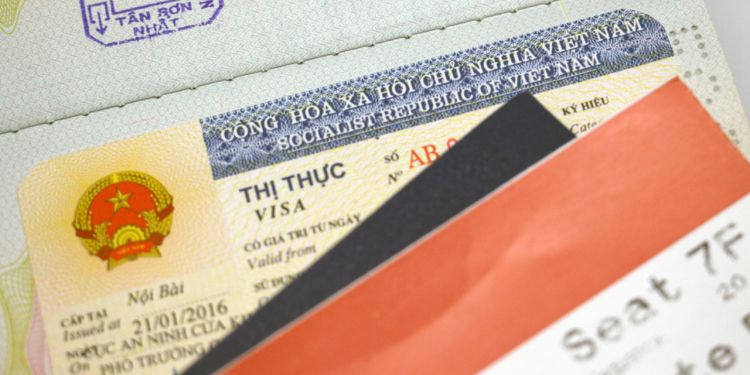
If you are only planning on having a short stay in Vietnam , you can apply online for a tourist visa , preferably at least one month before the scheduled date of departure. Your visa will be valid for the length of stay indicated on the application form; typically, this will range from 1-3 months.
Exemptions with visas for Vietnam
Currently, Vietnam offers visa exemptions to citizens of 25 countries. South East Asia citizens, mainly those from Thailand, Malaysia, or Cambodia, are permitted to stay for up to 30 days without a visa of any kind . Philippino citizens receive a unique 21-day visa exemption. The UK and numerous members of the European Union were awarded 45-day visa exemptions as of August 2023.
Citizens of the following 80 countries are eligible to apply for Vietnam's e-visa :
- Bosnia and Herzegovina
- Czech Republic
- China (including Hong Kong and Macau passports)
- Liechtenstein
- Marshall Islands
- Netherlands
- New Zealand
- Papua New Guinea
- Philippines
- Salomon Islands
- South Korea
- Switzerland
- Timor Leste
- United Arab Emirates
- United Kingdom
- United States of America
- Western Samoa
Read also Traveling to Vietnam
Types of visas for Vietnam
To avoid any complications or unexpected problems during your travel to Vietnam , it is prudent to understand the different types of visas in Vietnam . Below, we will proceed to help you understand these different categories. Although there are more than 20 different types of visas for Vietnam , there is no need to feel overwhelmed. The parameters of each category are fairly straightforward.
The two most important criteria are the purpose of the visit and validity . New immigration regulations - Law No. 51/2019/QH14 - came into place in August 2023. Since then, Vietnamese visas have been categorized into 21 main types, with the most common types of visas including:
- Tourist visa (DL);
- Business visa (DN1, DN2);
- Student/internship visa (DH);
- Investor Visa (DT1, DT2, DT3, DT4);
- Working visa (LD1 – LD2).
- 1-month single entry visa;
- 1-month multiple entry visa;
- 3-month single entry visa;
- 3-month multiple entry visa.
To help you out Here's our recommended visa service
Tourist visa
This type of visa is for visitors planning to come to Vietnam for leisure purposes only. It does not permit the recipient to conduct any business matters during their stay. The tourist visa is divided into four main subcategories:
- DT1 – to be granted to foreign investors in Vietnam and representatives of foreign organizations investing in Vietnam with a capital contribution of at least VND100 billion or investing in the business fields and areas of investment incentives decided by the Vietnam Government. It is valid for up to 5 years.
- DT2 – to be granted to foreign investors in Vietnam and representatives of foreign organizations investing in Vietnam with a capital contribution of VND50 – under VND100 billion, or investing in the business fields of investment encouragement decided by the Vietnam Government. It is valid for up to 5 years.
- DT3 – to be granted to foreign investors in Vietnam and representatives of foreign organizations investing in Vietnam with a capital contribution of VND3 – under VND50 billion. It is valid for up to 3 years.
- DT4 – to be granted to foreign investors in Vietnam and representatives of foreign organizations investing in Vietnam with a capital contribution of less than VND3 billion. Valid for up to 12 months.
Although booking a 3-month visa is completely feasible, the new legislation states that visitors on tourist visas will only be given a 30-day stamp on arrival . This means that should you wish to extend your stay, you will be required to visit the immigration office for another stamp.
Business visa
This is the second most common type of visa for Vietnam, and it is divided into two categories: DN1 and DN2 .
The DN1 visa is offered to those who are coming to Vietnam to work with other organizations and businesses . For example, IT consultants may reside in Vietnam on these visas.
The DN2 visa is given to foreigners who come to Vietnam to establish their own business or commercial presence of some kind. Additionally, those who offer a particular service or perform specific roles under international treaties in collaboration with Vietnam would also qualify for this type of visa.
As with the tourist visas, foreigners arriving on Vietnam business visas will have numerous options in terms of duration. Citizens of the United States also have the option of purchasing the Vietnam 1-Year Multiple Entry Visa .
Student visa
For foreign visitors about to attend a university course in Vietnam , a student visa is the best option. Students must apply for their visa after being accepted at the university. You will need to include a copy of the university acceptance in your visa application. Once approved, it will grant the student a 12-month visa and a DH temporary resident card . The student's passport must also be valid for at least one month after the 12 months of study.
Read also Studying in Vietnam
Investors visa
The investor visa is divided into four subcategories, and these classifications are based on the amount of capital the investor intends to bring :
Working visa
This type of visa is often acquired by ESL teachers coming to Vietnam . It grants the holder the right to live and work in Vietnam for a period of up to 2 years. Furthermore, renewing this type of visa is a relatively easy process. The work visa is separated into two main types:
- The LD1 visa is given to foreigners who possess a work permit exemption certificate .
- The LD2 visa is granted to those who need a work permit to legally work in Vietnam .
Obtaining this type of visa is simply a matter of requesting that your prospective employer arrange an LD approval letter . This must be done via the Vietnam Immigration Department . This document will then need to be stamped upon your arrival in Vietnam.
If you aren't currently in possession of a work permit or written confirmation of work permit exemption , you should consider applying for a business visa first. Obtaining a work visa will be subject to two kinds of fees. The first will be for the visa approval letter . The second is the stamping fee . If you are arriving in Vietnam to work at a school or language center, your HR department should handle all of this paperwork for you.
Read also Working in Vietnam
Other types of visa
As mentioned earlier, Vietnam has several kinds of visas for foreign visitors .
The diplomatic visas are awarded to foreign nationals at the behest of Vietnamese government officials of high rank or Vietnamese ministries. Visas of this nature are also given to consulate personnel liaising with Vietnamese authorities. These visas are not subject to any fees and are valid for a period of up to 12 months.
Other niche categories of visas include the Lawyer Visa (LS - max 5 years), Journalists with short-term residence in Vietnam (PV2 - 1 year), and family visits or other purposes for Vietnamese nationals (VR - 6 months).
Arrange your upcoming Vietnam visa
Luckily, there are hundreds of reputable companies situated in Vietnam that can help you with this process. The most common method of entry into Vietnam is by visa on arrival . This is simply a process of punching in your details on the Vietnam visa official website .
Before arranging your visa, make sure that your passport is valid for at least six months from the date of your arrival in Vietnam. Additionally, your passport should have at least two blank pages available. Vietnamese immigration officers are meticulous during their documentation inspection and will not approve passports with any damage, including refusing to admit visitors because of torn pages or other wear and tear damages.
Fees for visas and approval letters vary as some agencies include a modest commission. A multiple-entry visa is likely to cost $ 50 in the region. If you arrive via land border entry , you will need to complete a two-page form at immigration and have two passport photos plus the USD 25 stamping fee ready. When you arrive at the airport, you should have your arrival letter and visa printed from the online process. When you are departing from the previous airport, you will be asked to show these documents before being allowed to board.
Enjoy your stay in Vietnam
Vietnam is generally a safe country , but it is still advisable to remain on your guard. Arranging visas is one thing, but remember that Vietnam also has countless options for commuting . While here, you will be able to rent motorbikes or book taxis at exceptional rates.
Useful links:
Vietnam Visa Types and Validity – 20 Main Categories 2023
Vietnam Extends E-visa Validity to 3 Months | New eVisa Policy .
Ordinance On Entry, Exit And Residence Of Foreigners In Vietnam
The 30 teammates strong Expat.com squad comes from a plethora of countries.

Like most countries Vietnam requires that all arriving travelers have appropriate travel visas and a valid ...

A fairly convenient visa on arrival process has recently been introduced, but this requires a pre-arranged ...
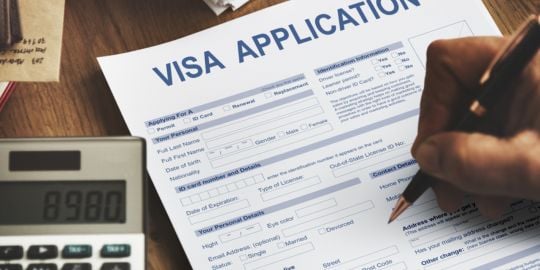
The tourist visa allows you to stay in Vietnam for a defined period. Find in this article useful information about ...

Here is some useful information abour the Vietnamese visa on arrival...

If your nationality is not exempted from Vietnam visa, you need to get a visa to Vietnam: Vietnam visa on arrival ...

If you're considering moving to Hanoi, or Ho Chi Minh City, the dating scene may be of interest to you ...
Find more topics on the Vietnam forum

Winter is here! Check out the winter wonderlands at these 5 amazing winter destinations in Montana
- Travel Destinations
How Long Is A Tourist Visa In Vietnam
Published: November 8, 2023
Modified: December 28, 2023
by Maurine Felton
- Plan Your Trip
Introduction
When planning a trip to Vietnam, one of the key factors to consider is the duration of your stay. As an international traveler, you will need a tourist visa to enter the country. Understanding the length of time that you can stay on a tourist visa is essential for proper trip planning.
Vietnam is a mesmerizing country with a rich history, vibrant culture, and stunning natural beauty. From bustling cities like Hanoi and Ho Chi Minh City to the serene landscapes of Halong Bay and Mekong Delta, there is so much to explore in Vietnam. Whether you are a history enthusiast, a food lover, or an adventure seeker, Vietnam has something for everyone.
In this article, we will provide an overview of tourist visas in Vietnam and delve into the duration of these visas. Whether you are planning a short visit or a longer stay, understanding the options available will help you plan your trip more effectively.
Overview of Tourist Visas in Vietnam
Before diving into the specifics of the duration of tourist visas in Vietnam, it is important to understand the different types of visas available. The two main categories of tourist visas in Vietnam are the single entry visa and the multiple entry visa.
The single entry visa allows travelers to enter Vietnam once and stay for a specific duration, typically ranging from 15 to 30 days. This type of visa is suitable for tourists who plan to visit Vietnam for a short period of time and do not intend to leave the country during their stay.
On the other hand, the multiple entry visa allows travelers to enter Vietnam multiple times within a specified period. This type of visa is ideal for tourists who plan to visit neighboring countries or take side trips during their stay in Vietnam. The duration of a multiple entry visa can vary, ranging from 30 days to one year.
It is important to note that the visa exemption policy applies to certain nationalities, allowing them to enter Vietnam without a visa for a specified period. However, this exemption usually has restrictions on the duration of stay and is applicable only to certain types of visits, such as tourism or business.
Now that we have an understanding of the different types of tourist visas in Vietnam, let’s explore the duration of these visas in more detail.
Duration of Tourist Visas in Vietnam
The duration of tourist visas in Vietnam depends on the type of visa you apply for and your travel plans. Let’s take a closer look at the duration for both single entry and multiple entry visas.
For single entry tourist visas, the duration typically ranges from 15 to 30 days. Most tourists are granted a 30-day visa upon arrival or through the e-visa system. This allows visitors to explore the country for a decent amount of time and experience its diverse offerings.
If you have plans to stay in Vietnam for longer than 30 days or need the flexibility to enter and exit the country multiple times, then a multiple entry visa is the ideal choice. The duration for multiple entry visas can vary depending on the specific visa type and your travel plans. Some multiple entry visas allow stays of up to 90 days per entry, while others can be valid for up to one year.
It is important to note that the duration of your stay is counted from the day you enter Vietnam. If you overstay your visa, you may be subject to fines or other legal consequences. Therefore, it is crucial to be aware of the expiration date on your visa and make arrangements for an extension if necessary.
Additionally, when applying for a tourist visa, it is recommended to have a clear travel itinerary and proof of onward travel, such as return tickets or a detailed plan. This helps demonstrate your intent as a genuine tourist and can facilitate a smooth visa application process.
Now that we have covered the duration of tourist visas, let’s explore the specific details of single entry and multiple entry tourist visas in Vietnam.
Single Entry Tourist Visas
A single entry tourist visa is ideal if you plan to visit Vietnam for a short period and do not intend to leave the country during your stay. The duration of a single entry tourist visa typically ranges from 15 to 30 days, depending on the specific visa type and your travel plans.
There are several ways to obtain a single entry tourist visa for Vietnam. One option is to apply for a visa at a Vietnamese embassy or consulate in your home country before your trip. This process usually involves submitting the required documents, such as a completed application form, passport, and payment of the visa fee. The visa will then be stamped on your passport, allowing you entry into Vietnam.
Another option is to apply for a visa on arrival through a reputable visa agency. This is a convenient and popular choice for many travelers. With a visa on arrival, you can apply online and receive an approval letter via email. Upon arrival at one of Vietnam’s international airports, you will present the approval letter, pay the stamping fee, and have your visa stamped on your passport.
It is important to note that the exact duration of a single entry tourist visa can vary depending on the visa type and the immigration officer’s discretion. Therefore, it is advisable to check the specific details and validity period of your visa beforehand.
Once you have obtained your single entry tourist visa, keep in mind that it allows you to stay in Vietnam for the specified duration but does not permit multiple entries or exits. If you plan to leave Vietnam and re-enter during your trip, you will need to apply for a new visa or consider a multiple entry tourist visa.
Now that we have covered single entry tourist visas, let’s explore the details of multiple entry tourist visas in Vietnam.
Multiple Entry Tourist Visas
If you plan to visit Vietnam and have the need to enter and exit the country multiple times during your stay, a multiple entry tourist visa is the best option for you. This type of visa provides greater flexibility and convenience for travelers with diverse itineraries.
The duration of a multiple entry tourist visa can vary depending on the specific visa type and your travel plans. Some multiple entry visas allow stays of up to 90 days per entry, while others can be valid for up to one year. It is important to note that the duration for each stay is usually counted from the day of entry into Vietnam.
To apply for a multiple entry tourist visa, you have a few options. One option is to apply for the visa at a Vietnamese embassy or consulate in your home country before your trip. This typically involves submitting the required documents, such as a completed application form, passport, and payment of the visa fee. Once approved, the visa will be stamped on your passport, allowing multiple entries into Vietnam within the specified period.
Another option is to apply for a multiple entry visa through a reputable visa agency or online service. This is a convenient option that allows you to apply for your visa online and receive an approval letter via email. Upon arrival at one of Vietnam’s international airports, you will present the approval letter, pay the stamping fee, and have your multiple entry visa stamped on your passport.
Keep in mind that the specific requirements and validity periods for multiple entry visas may vary. It is important to check the details and restrictions associated with your specific visa type to ensure a smooth and hassle-free travel experience.
With a multiple entry tourist visa, you can freely enter and exit Vietnam as many times as allowed within the visa’s validity period. This makes it convenient for travelers who plan to explore Vietnam’s neighboring countries or take side trips during their stay.
Now that we have covered multiple entry tourist visas, let’s explore the option of extending your visa if you need to stay longer than initially planned.
Extension of Tourist Visas
If you find yourself needing to stay in Vietnam for a longer period than initially planned, it is possible to extend your tourist visa. The visa extension process allows you to legally prolong your stay in the country beyond the expiration date of your current visa.
The extension process must be initiated before your current visa expires. To extend your tourist visa, you can visit the nearest Immigration Office in Vietnam or seek the assistance of a reliable visa agency. The specific requirements and procedures may vary depending on your visa type and the duration of the extension you are seeking.
It is important to note that not all visas are eligible for extension. Some visa types, such as visa exemption policies and certain e-visas, are non-extendable. Therefore, it is crucial to check the limitations and eligibility of your specific visa type before considering an extension.
When applying for a visa extension, you may be required to submit the necessary documents, such as a completed extension application form, passport, and payment of the extension fee. The fee for visa extensions can vary depending on the duration of the extension you are seeking.
It is recommended to start the extension process well in advance, as it can take several days or even weeks to process. Overstaying your visa is not advisable, as it can result in fines, travel restrictions, or other legal consequences.
While visa extensions can provide additional time in Vietnam, they are subject to approval by the Vietnamese authorities. It is important to note that visa extensions are not guaranteed and may be granted or denied based on various factors, including the discretion of the immigration officers.
Therefore, it is always best to plan your trip and visa duration accordingly to avoid any inconvenience or complications. If you foresee the need for a longer stay in Vietnam, consider applying for a multiple entry tourist visa from the beginning or consult with a visa agency for expert guidance.
Now that we have covered the extension of tourist visas, let’s summarize some important points for tourists planning a trip to Vietnam.
Points to Consider for Tourists Visiting Vietnam
When planning a trip to Vietnam, there are several important points to consider to ensure a smooth and memorable experience. Let’s explore some key factors that tourists should keep in mind:
- Visa Requirements: Check the visa requirements for your nationality and ensure that you have the necessary visa before traveling to Vietnam. Research the different types of visas available and choose the one that best suits your travel plans.
- Duration of Stay: Determine the duration of your stay in Vietnam and select the appropriate visa type accordingly. Be aware of the expiration date on your visa and make arrangements for an extension if needed.
- Entry and Exit Points: Determine your entry and exit points in Vietnam based on your travel itinerary. Ensure that your visa type allows for multiple entries if you plan to leave and re-enter the country.
- Proof of Onward Travel: Have a clear travel itinerary and proof of onward travel, such as return tickets or a detailed plan. This helps demonstrate your intent as a genuine tourist and can facilitate a smooth visa application process.
- Visa Extension: If you foresee the need for a longer stay in Vietnam, familiarize yourself with the visa extension process. Start the extension process well in advance to avoid any inconvenience or complications.
- Respect Local Customs and Laws: Familiarize yourself with the local customs and laws in Vietnam. Respect the traditions, cultural norms, and religious practices of the local people. It is important to dress modestly, especially when visiting religious sites.
- Health and Safety: Take necessary precautions for your health and safety while traveling in Vietnam. Research any required vaccinations and carry travel insurance. Be cautious of your belongings, avoid isolated areas at night, and be aware of your surroundings.
- Currency and Banking: Familiarize yourself with the local currency, Vietnamese Dong (VND), and ensure you have enough cash for your trip. ATMs are widely available in major cities, but it’s always good to have some cash on hand, especially if traveling to remote areas.
- Local Transportation: Research the local transportation options in Vietnam, such as taxis, buses, motorbike taxis (xe om), and trains. Familiarize yourself with the local traffic rules if you plan to drive a motorbike or hire a driver.
- Explore the Local Cuisine: Vietnam is renowned for its delicious street food and diverse cuisine. Don’t miss the opportunity to try local dishes such as pho, banh mi, and fresh spring rolls. Be cautious of street food hygiene and choose reputable establishments.
By considering these points, you will be well-prepared to experience the beauty, culture, and warmth of Vietnam during your visit.
In conclusion, understanding the duration of tourist visas in Vietnam is essential for planning a successful trip to this captivating destination. Whether you opt for a single entry visa or a multiple entry visa, knowing the specifics of each can help you make informed decisions and ensure a seamless travel experience.
The duration of single entry tourist visas typically ranges from 15 to 30 days, whereas multiple entry tourist visas offer more flexibility, allowing for stays of up to 90 days per entry or even up to one year. It is important to note that the specific visa type, entry and exit points, and immigration regulations can determine the duration permitted in Vietnam.
If you need to extend your stay, you have the option to apply for a visa extension. However, it is crucial to initiate the process before your current visa expires and be aware that not all visas are eligible for extension.
When planning your trip to Vietnam, be mindful of visa requirements, understand the local customs and laws, and prioritize your health and safety. Take the time to explore the vibrant cuisine and immerse yourself in the rich cultural heritage of Vietnam.
By considering these factors and preparing accordingly, you can make the most of your visit to Vietnam and create unforgettable memories. So, get ready to explore the enchanting landscapes, indulge in mouthwatering delicacies, and experience the warm hospitality of Vietnam.
Start planning your trip today and get ready for an extraordinary adventure in this remarkable Southeast Asian country.

- Privacy Overview
- Strictly Necessary Cookies
This website uses cookies so that we can provide you with the best user experience possible. Cookie information is stored in your browser and performs functions such as recognising you when you return to our website and helping our team to understand which sections of the website you find most interesting and useful.
Strictly Necessary Cookie should be enabled at all times so that we can save your preferences for cookie settings.
If you disable this cookie, we will not be able to save your preferences. This means that every time you visit this website you will need to enable or disable cookies again.

Vietnam Visa Extension – All Travelers Should Know
Are you here in Vietnam but you want to stay in the country longer while the Vietnam visa is about to expire? Do you need to get a new Vietnam visa or are there some ways to legitimately lengthen the stay? Let’s find out about the Vietnam visa extension in the post below.
1. What is Vietnam visa extension?
You must have heard of Vietnam visa extension and visa renewal, so what is the difference between those two?
Actually visa extension is the action of prolonging your stay in Vietnam with a new stamp in the passport clarifying a new duration while renewal will be like you are applying for a new Vietnam visa stamp. In addition, foreigners can extend their Vietnam visa without leaving the country while visa renewal requires expats to leave Vietnam and then enter with a new visa.
2. Policy of Vietnam visa extension during Covid19
Due to the outbreak of Covid19, the Vietnam Immigration Department has released the policy of automatic Vietnam visa extension. Therefore:
- Those who come to Vietnam after March 1, 2020 and are stuck in the country by the pandemic will be automatically extended their visa until November 30, 2020. It means you will not be subjected to fine, or penalty if you exit Vietnam by November 30, 2020 due to being stranded here.
- Those who come to Vietnam before March 1, 2020 can be also applicable for the policy, but they are required to show documents proving they couldn’t depart from the country because of the Covid 19.
3. How to extend visa in Vietnam
Before applying for Vietnam visa extension, please be reminded that your passport is at least 6 months in validity and 2 blank pages for immigration procedures.
Vietnam visa extension will be different from each case, so for the exact required documents and process, please contact directly with the office of Immigration Department you are going to submit at:
- Hanoi Immigration office: 44-46 Tran Phu, Ba Dinh District, Hanoi
- Danang Immigration office: 78 Le Loi, Thach Thang, Hai Chau, Da Nang
- Ho Chi Minh City Immigration office: 196 Nguyen Thi Minh Khai, Ward 6, District 3, Ho Chi Minh city
Working hours:
- Monday-Friday (Morning: 7am – 11h30am; Afternoon: 1h30pm – 5pm); and
- Saturday (Morning time only)
4. Vietnam visa extension types
The new duration of stay will depend on your current Vietnam visa, and it is currently 1 month, 3 months and 6 months types as follows:
Extend visa for 1 month if:
- Foreigners coming to Vietnam with Vietnam visa exemption;
- Foreigners coming to Vietnam with 1 month Vietnam tourist visa;
- Foreigners coming to Vietnam with 3 months Vietnam tourist visa;
- Foreigners coming to Vietnam with Vietnam e-visa;
- US citizens coming to Vietnam with 1-year Vietnam tourist visa;
Extend visa for up to 3 months if:
- Foreigners coming to Vietnam with 1 month Vietnam business visa;
- Foreigners coming to Vietnam with 3 months Vietnam business visa;
- US citizens coming to Vietnam with 1-year Vietnam business visa;
- Foreigners coming to Vietnam holding APEC Business Travel Card;
Extend visa up to 6 months if:
- Foreigners coming to Vietnam with 5-year Vietnam visa exemption certificate;
Here are all the things that you should know to extend your visa in Vietnam. In case you have difficulty, just contact the Immigration Department or a visa agent for assistance. In case your number of extension times has reached to its limit, you may consider a visa run . However, this way of extending your stay in Vietnam is not available in this COVID.
How Long Does It Take to Get a Vietnam Visa?

It’s quick to apply for a Vietnam visa online. With the relevant information and documents on hand, you can fill out the application form in minutes .
Electronic visa applications do not require you to spend time traveling to the Vietnamese Embassy, or waiting in line for a visa on arrival at the airport. The eVisa process is 100% electronic .
After submitting the online form, your Vietnam eVisa application will be sent for processing. This guide helps you understand the eVisa waiting times so you can plan your trip with ease.
How Fast Can I Get a Visa for Vietnam?
Online Vietnam visa processing times are quicker than traditional in-person applications made at an embassy or consulate.
The Vietnam tourist visa processing time is around 3 days for online applications. Occasionally, the request may take up to 10 days to process.
On approval, the visa is sent directly by email. You do not need to go and collect the visa from an embassy or wait for it to arrive in the mail.
How Far in Advance Should I Apply for a Vietnamese Visa?
Vietnam eVisa processing is fast and travelers do not need to apply weeks in advance. As mentioned above, most people receive the approved visa within 3 days .
Nevertheless, tourists are advised to allow extra time , in case of any unexpected delays. Processing delays are rare and are usually a result of mistakes or missing information on the submitted visa form, which can be easily avoided.
For fast Vietnam visa processing times , applicants should carefully check the information on the completed eVisa form before submitting it.
Travelers can apply for a Vietnam visa as soon as they know their arrival date. The online form requires applicants to state the date they’ll enter Vietnam.
How Long Does It Take to Process a Visa on Arrival?
To get a Vietnam visa on arrival , travelers must pre-register online for an Approval Letter . They receive the Approval Letter by email, which they must print out and exchange for a visa on arrival at the airport.
As visa on arrival applicants have to register online for an Approval Letter, and wait in line for their visa at the airport, it is a longer process than the eVisa application .
For the fastest Vietnam visa processing times, tourists are advised to use the eVisa system. Visitors who travel to Vietnam with an approved visa can avoid waiting in line for a visa on arrival at the airport.
Errors That Can Delay Vietnam Visa Processing
Vietnam visa processing delays are rare , but can be caused by missing information or mistakes on the application form.
Travelers should check they have included all the requested information correctly before submitting the form.
Common errors that could cause delays include:
- Passport number copied incorrectly
- Name not written exactly as it appeared on the passport
- Typographical errors
Personal details and passport information have to match the travel document exactly . Passengers with dual nationality must apply for a visa and travel to Vietnam using the same passport. Other details to double-check include the date of arrival in Vietnam, and the email address.
Vietnam visa applications may be denied if submitted containing errors. A new visa form must then be submitted and processed.
Vietnam visa processing times may also be longer at times of high demand.
How Long Does It Take to Renew a Vietnam Visa?
Vietnam visas cannot be extended online . Travelers in Vietnam who wish to stay in the country longer than their visa allows must contact the immigration department in Vietnam.
The maximum stay in Vietnam with an eVisa is 90 days. Instead of extending the visa from within Vietnam, visitors can depart the country and apply for a new electronic visa . Processing times for the second application are the same—3 days.
Advice for Fast Vietnam Visa Processing
In summary, travelers who want to get a Vietnam visa as quickly as possible should:
- Apply for a visa for Vietnam online
- Check their passport is valid for at least 6 months beyond their arrival date
- Have passport details on hand before starting the application
- Double-check the form and correct any errors
By following these guidelines, visitors can enjoy fast Vietnam online visa processing .
Related Posts

Business Visa for Vietnam - Application and Requirements

Vietnam Visa Application at an Embassy

Can I Extend My Vietnam eVisa?
Cookies on GOV.UK
We use some essential cookies to make this website work.
We’d like to set additional cookies to understand how you use GOV.UK, remember your settings and improve government services.
We also use cookies set by other sites to help us deliver content from their services.
You have accepted additional cookies. You can change your cookie settings at any time.
You have rejected additional cookies. You can change your cookie settings at any time.
- Passports, travel and living abroad
- Travel abroad
- Foreign travel advice
Entry requirements
This information is for people travelling on a full ‘British citizen’ passport from the UK. It is based on the UK government’s understanding of the current rules for the most common types of travel.
The authorities in Vietnam set and enforce entry rules. If you’re not sure how these requirements apply to you, contact the Vietnamese Embassy in the UK .
COVID-19 rules
There are no COVID-19 testing or vaccination requirements for travellers entering Vietnam.
Passport validity requirements
To enter Vietnam, your passport must have:
- an ‘expiry date’ at least 6 months after the date you arrive
- at least 2 blank pages
- no damage – British nationals have been denied entry and exit due to passport damage
Check with your travel provider that your passport and other travel documents meet requirements. Renew your passport if you need to.
You will be denied entry if you do not have a valid travel document or try to use a passport that has been reported lost or stolen.
Make sure you get your passport stamped.
Check the visa expiry date written in your passport is correct before leaving border control. If it is wrong, you could be accused of overstaying.
Visa requirements
You can visit Vietnam without a visa for up to 45 days for tourism or business.
If you want to stay longer than 45 days, you can:
- book with a travel agent in Vietnam and ask them to apply for a visa pre-approval letter – your agent will tell you when to collect your visa from the embassy
- apply for other visa types from the Vietnamese Embassy in the UK
- apply for an e-visa that allows a 90-day stay and multiple entries
E-visas restrict you to the entry and exit points you select when you apply. If you get an e-visa while in Vietnam, you must exit the country and re-enter to start your e-visa.
The British Embassy will not assist with visa extensions.
Work or study
If you want to work or study, check which type of visa or work permit you need with the Vietnam Immigration Department .
Read about visas and work permits if you live in Vietnam .
If you overstay your visa or work illegally, the authorities can prevent you from leaving until you pay a fine. You could be deported and prevented from visiting Vietnam in the future.
Travelling through Vietnam
If you transfer from an international flight to a domestic flight in Hanoi or Ho Chi Minh City, you must go through immigration and enter Vietnam. You must do this even if your final destination is outside Vietnam.
Check with your airline before departing.
Vaccine requirements
For details about medical entry requirements and recommended vaccinations, see TravelHealthPro’s Vietnam guide
Customs rules
There are strict rules about goods you can take into or out of Vietnam . You must declare anything that may be prohibited or subject to tax or duty.
If you’re taking prescription medication into Vietnam, carry it in your hand luggage with a copy of the prescription. If it has a total import value greater than 100 US dollars, you must declare it at customs. For information about restrictions on medication, see Health .
Taking money into or out of Vietnam
If you’re taking cash into or out of Vietnam, you must declare amounts over:
- 15 million Vietnamese dong
- 5,000 US dollars (or the same value in other currencies)
If you’re leaving the country with more than these amounts, declare the money at customs and show either:
- confirmation you’re carrying cash abroad, issued by an authorised credit institution
- written approval to carry cash, issued by the State Bank of Vietnam
Related content
Is this page useful.
- Yes this page is useful
- No this page is not useful
Help us improve GOV.UK
Don’t include personal or financial information like your National Insurance number or credit card details.
To help us improve GOV.UK, we’d like to know more about your visit today. We’ll send you a link to a feedback form. It will take only 2 minutes to fill in. Don’t worry we won’t send you spam or share your email address with anyone.

IMAGES
VIDEO
COMMENTS
Get ready for your Vietnam trip with this guide to tourist visas. Find all the information you need on Vietnam's e-visa, visa on arrival, and visa exemptions. ... Carnaval Ha Long 2024 28 Apr 2024 - 28 Apr 2024; View all. Plan your trip. Visa Requirements ... Vietnam's new visa policy effective from 15th August 2023 extends stay duration for ...
And those that require a visa can get an E-Visa or a visa from any nearest Vietnamese embassy. Currently, there are 2 different visa options available to enter Vietnam as a tourist. Visa exemption: 25 countries are visa EXEMPT for stays from 14 days to 45 days. E-Visa: All nationalities can obtain eVisa for stays up to 90 days.
The most popular type of visa for Vietnam is a tourist visa, which is normally valid for 15-90 days. You can apply for a 3-month tourist visa, but the procedure will be the same as for a 1-month visa. In other words, the validity of a Vietnamese tourist visa can range from 15 days to 3 months. If you need to stay in Vietnam for longer than 30 ...
Short summary about Vietnam visa for US (United states) Citizens: All US passport holders wishing to visit Vietnam MUST have a valid visa for Vietnam,; US citizens can now apply for Vietnam evisa, valid for up to 90 days, single or multiple entry; Vietnam visa fee and processing time for US passport holders vary, depending on the type of visa, way of application (themselves or via a service ...
How Long Can You Stay In Vietnam With A Tourist Visa. Thе duration of stay you are allowed with a tourist visa in Viеtnam can vary dеpеnding on the type of visa you obtain and the specific terms and conditions Hеrе arе somе standard options: 1. Singlе-Entry Tourist Visa
The e-visa is valid for 90 days, and multiple entry. As of 15th August 2023, Vietnam's e-visa is available to all countries/territories around the world. Travellers can apply directly for e-visas at Vietnam e-Visa Official Website. Vietnam's e-Visa is a simple, online approval process available to citizens of 80 countries.
Immigration Department in Hanoi. Address: 44-46 Tran Phu, Ba Dinh, Hanoi. Phone: (24) 3825-7941. Email: [email protected]. Immigration Office in Da Nang. (Handing Vietnamese visa and residence applications for foreigners residing in Central Vietnam) Address: 78 Le Loi, Hai Chau, Da Nang. Phone: 0694260192 - 0906091269.
For more information (only for visa applicant at the Embassy), please contact the Consular Division of the Embassy: * Business hours: 9:00 A.M - 12:00 P.M and 02:00 P.M - 04:30 P.M from Monday through Friday, except on Viet Nam and United States holidays. - Address: 1233 20th Street NW, Suite 400, Washington D.C., 20036.
Contact your local embassy or consulate for fees for in-person or postal applications. To get a Visa on Arrival, you must first pay a fee to a visa agency for a "visa pre-approval letter". For a single-entry visa, this costs around US$17 for 30 days and US$25 for 90 days. For a multiple-entry visa, the fee is around US$20 for 30 days and US$65 ...
The documents you have to submit when you apply for a Vietnam Tourist Visa include: Your passport, which must be valid for at least another six months. Passport-size pictures in line with Vietnam guidelines: Size: 4 cm x 6 cm. Taken recently.
An electronic visa (E-visa) is one of visa types issued to foreigners by Vietnamese Immigration Department via electronic system. Vietnam E-visa is valid for maximum of 90 days, single or multiple entry. Outside Vietnam foreigners who want to enter Vietnam can personally apply for E-visa or through the requesting agencies and organizations.
For additional assistance, please contact our team at Vietnam Visa. You can reach us by email at [email protected], or you can call us on our hotline at (+84) 832-320-320. Apply Now. If you plan to travel to Vietnam and need help getting a Vietnam visa, check out our frequently asked questions page.
This includes several European countries, and allows you to visit Vietnam visa-free for up to 15 days. My experience applying for a Vietnam e-visa. ... How long Vietnam e-visa approval takes. Vietnam claims it can take up to three working days for a visa to be approved. I planned this trip pretty last minute (around a week out), and submitted ...
Do I Need a Visa for Vietnam? You need a visa for Vietnam unless you are from one of the following countries, whose citizens are allowed to travel to Vietnam visa-free for a short-term period (14 - 90 days):. Belarus* (visa-free travel for up to 15 days); Brunei (visa-free travel for up to 14 days); Cambodia (visa-free travel for up to 30 days); Chile (visa-free travel for up to 90 days)
Call us in Washington, D.C. at 1-888-407-4747 (toll-free in the United States and Canada) or 1-202-501-4444 (from all other countries) from 8:00 a.m. to 8:00 p.m., Eastern Standard Time, Monday through Friday (except U.S. federal holidays). See the State Department's travel website for the Worldwide Caution and Travel Advisories.
If you are in the United States, you may contact the Vietnamese Embassy or Consulate for official instructions. If you are in Vietnam, please contact the nearest Vietnamese Immigration Office. For travelers entering Vietnam, the Ministry of Health requires either a negative PCR test taken within 72 hours of travel or rapid test taken with 24 hours.
1. If you are only planning on having a short stay in Vietnam, you can apply online for a tourist visa, preferably at least one month before the scheduled date of departure. Your visa will be valid for the length of stay indicated on the application form; typically, this will range from 1-3 months.
Vietnam Visa Types by Purpose of Visit. According to the new immigration regulations that took effect in July 1, 2020 ( Law No. 51/2019/QH14 ), Vietnam visa is classified into about 21 main types by the purpose of visit, namely DL, DN1, DN2, NG, DT1, DT2, DT3, DT4, LS, DH, LV, LD1, LD2, HN, PV1, TT, SQ, etc.
Duration of Tourist Visas in Vietnam. The duration of tourist visas in Vietnam depends on the type of visa you apply for and your travel plans. Let's take a closer look at the duration for both single entry and multiple entry visas. For single entry tourist visas, the duration typically ranges from 15 to 30 days.
The new duration of stay will depend on your current Vietnam visa, and it is currently 1 month, 3 months and 6 months types as follows: Extend visa for 1 month if: Foreigners coming to Vietnam with Vietnam visa exemption; Foreigners coming to Vietnam with 1 month Vietnam tourist visa; Foreigners coming to Vietnam with 3 months Vietnam tourist visa;
The Vietnam tourist visa processing time is around 3 days for online applications. Occasionally, the request may take up to 10 days to process. On approval, the visa is sent directly by email. You do not need to go and collect the visa from an embassy or wait for it to arrive in the mail.
Foreigners who entered Vietnam on a visa exemption, an e-visa or a tourist visa after 1 March 2020 will have their temporary residence permit automatically extended until 31 July 2021 but will need to declare temporary residence and medical information in accordance with Vietnamese regulations.
Visa requirements. You can visit Vietnam without a visa for up to 45 days for tourism or business. If you want to stay longer than 45 days, you can: